ELITE WOMEN 2023
Exceptional female leaders revealed
COMMERCIAL LENDERS ROUNDTABLE

Key figures in the sector discuss the market
AUSTRALIAN MORTGAGE AWARDS
Excellence Awardees chosen ahead of big night

ELITE WOMEN 2023
Exceptional female leaders revealed
COMMERCIAL LENDERS ROUNDTABLE

Key figures in the sector discuss the market
AUSTRALIAN MORTGAGE AWARDS
Excellence Awardees chosen ahead of big night

Exploring the many ways the industry is creating an inclusive space for all





Got a story or suggestion, or just want to find out some more information?




Commercial lenders and brokers meet to discuss the strengths and challenges of this growing sector

MPA honours this year’s exceptional female leaders who are breaking boundaries as influential role models in the mortgage and finance industry

CommBank’s acting


GM third party banking wants to “pay it forward” by supporting her mentees and the bank’s commitment to advancing gender equality and cultural representation
In this special edition, MPA highlights the e orts of brokers, lenders and aggregators to embrace and encourage D&I
Lendi Group’s Pathways program is tailored to developing brokers at all stages of their journey
twitter.com/MPAMagazineAU





facebook.com/Mortgage ProfessionalAU
02 Editorial
The way forward to broader industry representation of people
04 Statistics
Rental growth is still well above average
06 Opinion
How customer-owned banks prioritise strong social values







20 Community outreach Support for the community has driven success for Mortgage Choice franchisee
22 Paving the way
The FBAA’s Artemis Space enables women to connect, grow and succeed

24 Winning workplace culture

OnDeck gives its people a shared sense of purpose as a Best Place to Work

26 Women in broking


The MFAA continues to build on its initiatives to boost female participation
28 Pride with a purpose
NAB Pride works to empower the bank’s LGBTI+ employees and customers



30 Building financial literacy
SFG member Niti Bhargava talks about her program to educate migrant women




62 Brokerage insight
The fintech providing a gateway to fast and flexible non-bank solutions



64 Other life
Broker Narelle Kerstan takes time out to support her son’s go-kart racing dream
MPAMAG.COM/AU
NOW ONLINE:
Our daily newsletter. Keep on top of property market trends, business strategy, and what industry leaders have to say.

You can’t be what you can’t see. It’s a well-known phrase that’s used a lot when it comes to discussions about diversity and inclusion in the financial services industry. The idea is that people are more likely to follow a particular career path, such as broking or banking, if they can see others in those roles who share the same gender, culture, class, religion, sexual orientation or disabilities.
It sounds obvious, but if you see a successful broker who looks like you, speaks the same language and shares the same values, you’ll hopefully be inspired and realise that if they can do it, so can you.
The mortgage and finance industries were long considered an arena in which you were more likely to find white, middle-class males, particularly in senior positions. While this is now changing, particularly as Australia becomes a more multicultural society and we are far more accepting of di erences, more needs to be done to create an industry that is truly reflective of our nation.
The MFAA Industry Intelligence Service 15th Edition report, covering 1 April to 30 September 2022, revealed that the proportion of female brokers had decreased by 0.2 percentage points to 25.4%, the lowest level on record. While the number of
www.mpamag.com/au
EDITORIAL
Editor Antony Field Writers
Kim Champion, Mina Martin
Contributors
Chris Green, Fleur Heazlewood, Michael Lawrence
Lead Production Editor Roslyn Meredith
Production Editor Allison Ingusan
ART & PRODUCTION
Designer Cess Rodriguez
Customer Success Manager
Isabella Concepcion
Customer Success Executive Shara Cruzat
SALES & MARKETING
Publisher Claire Tan CORPORATE
Chief Executive Officer
Mike Shipley
Chief Operating Officer
George Walmsley
Chief Commercial Officer
Justin Kennedy
Chief Information Officer Colin Chan
Chief Revenue Officer Dane Taylor
Director – People and Culture
Julia Bookallil
EDITORIAL ENQUIRIES
tel: +612 8437 4711 antony.field@keymedia.com
SUBSCRIPTION ENQUIRIES
tel: +61 2 8311 5831 • fax: +61 2 8437 4753 subscriptions@keymedia.com.au
ADVERTISING ENQUIRIES claire.tan@keymedia.com
KM Business Information Australia Pty Ltd tel: +61 2 8437 4700 • fax: +61 2 9439 4599 www.keymedia.com
Australia, Canada, USA, UK, NZ and Asia
females recruited grew 26.9% year-on-year during that period, compared to male recruits at just 10.6% growth, the actual number of females joining the industry paled in comparison to the number of males – typically, they amount to less than half the number of new male recruits in each six-month period.
This issue of MPA puts the focus on diversity and inclusion and highlights the e orts of various aggregators and lenders to ensure that their sta or members and partners empower and embrace di erent communities. Among the topics explored are the importance of supporting women in the industry; e orts to improve financial literacy; working with people of non-English-speaking backgrounds; support for the LGBTI+ community; and creating a great workplace culture.
We also look at the latest issues a ecting business finance in MPA’s annual Commercial Lenders Roundtable; reveal the Elite Women for 2023; and discover how Lendi Group creates career pathways for its brokers.
We hope you enjoy the latest edition.
Antony Field, editor, MPAMortgageProfessionalAustralia is part of an international family of B2B publications and websites for the mortgage industry

AUSTRALIAN BROKER simon.kerslake@keymedia.com
T +61 2 8437 4786
NZ ADVISER alex.knowles@keymedia.com
T +61 2 8437 4708
CANADIAN MORTGAGE PROFESSIONAL john.mackenzie@keymedia.com

T +1 416 644 8740
MORTGAGEBROKERNEWS.CA corey.bahadur@keymedia.com
T +1 416 644 8740
MORTGAGE PROFESSIONAL AMERICA katie.wolpa@keymedia.com
T +1 720 316 7423
MORTGAGE INTRODUCER (UK) matt.bond@keymedia.com
T +44 7525 456869
If you see a successful broker who looks like you, speaks the same language and shares the same values, you’ll hopefully realise that if they can do it, so can you


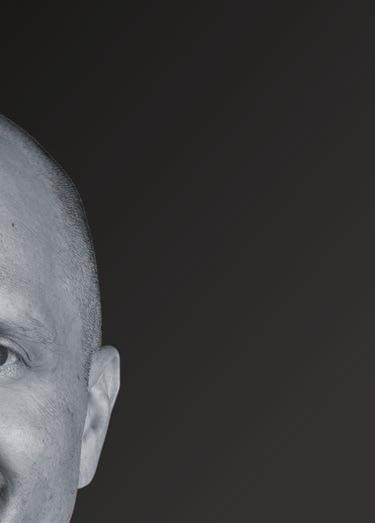






$9.6trn Total worth of Australian real estate

Median rents in Australia increased by 2.5% in the June quarter, down from the 2.8% rise seen over the three months to May. Despite the slowdown in the pace of growth, national rental growth remained well above average, CoreLogic data showed.


REGION
Sydney
Melbourne
Brisbane
Adelaide
Perth
Hobart
Darwin
Canberra
Combined capitals
10.9 million
Combined regionals
National
$2.2trn
Value of outstanding mortgage debt
The total number of dwellings approved in Australia jumped by 20.6% in May, in seasonally adjusted terms, after a 6.8% fall the prior month, according to ABS data. The approvals growth was driven by a 59.4% increase in private sector dwellings, including houses, and particularly by the large number of apartment developments approved in NSW in May.

56.1% Percentage of household wealth held in housing



The CommBank Household Spending Intentions index dipped by 1.7% over the month of June in original terms, taking the index down to 116, with homebuying, one of the main drivers of the decline, down 26.2% month-on-month.
CHANGE IN HOUSEHOLD SPENDING INTENTIONS, JUNE 2023
National vacancy rates increased marginally in June, providing renters with some much-needed relief. PropTrack data showed a quarterly rise of 0.14 ppts in vacancy rates, the most significant easing in rental market conditions since November 2020.
CHANGE IN RENTAL VACANCY RATES FOR ALL DWELLINGS, JUNE 2023

More than two-thirds of mortgage holders are planning to refinance or seek a rate review in the next year, the inaugural InfoChoice Real Mortgage Survey shows. Leading the charge are millennial and Gen Z homeowners. with 78% of 27- to 42-year-olds looking to refinance or seek a rate review.
OVER THE NEXT YEAR, WILL YOU REFINANCE OR SEEK A RATE REVIEW?

whether that be people working in a particular industry such as the police, members of a regional community, or Aboriginal and Torres Strait Islanders.

Amid a heightened consciousness around issues like equality, inclusion, justice and climate change, people increasingly expect their service providers to contribute to solving them. Mortgage brokers can strengthen their relationships with clients by validating this requirement, and helping them find a bank that meets their needs on a more holistic basis.
When we talk about delivering more than competitive interest rates, what do we mean?

WHILE SOARING interest rates and increased living costs are prompting homeowners to consider their existing arrangements to ease their budget stress, we know that people want their banks to do more than just meet their fundamental financial needs.
For many people, purchasing a property will be the biggest financial commitment they will make in their lives. The broker community can provide a level of added value and service to their clients by o ering to put their business with an institution that sits outside the main Australian banking brands – and, in turn, provides other benefits to the community.
As more people choose services that align with their ethics and values, our research at the Customer Owned Banking Association has found that 84% of people want a higher purpose from their bank.
The much-discussed mortgage cli is an opportunity for people to find not just a better rate but a bank that aligns with their values – whether that be through sustainability, supporting a charity they care about, or giving back to the local community.
Brokers account for nearly 70% of the mortgage market and play a powerful role in helping consumers find a bank that does more than just meet their financial needs. Smaller banks can deliver competitive rates, but they can also provide critical community support. And they do all this while aspiring to treat every member engagement as a personal one, which is another of the key di erentiators between the large banks and member-owned banks.
Because customer-owned banks don’t squeeze customers to pay shareholder dividends, they can do things that other banks can’t and put people before profits – meaning that customer-owned banks focus on strong customer outcomes, building better products and services, and paying it forward into the community.
COBA members create great outcomes for customers because of an innate emphasis on customer service and community engagement. According to Roy Morgan research, customer-owned banks have market-leading
We mean community support, local sports and event sponsorships, education programs, disaster support, and in many cases profession-based education services and product development. With no shareholders to appease, all profits are reinvested in delivering customer outcomes and supporting the community.
Customer-owned banks are leaders in making a positive impact on the world. Bank Australia is at the forefront of environmental responsibility as the first bank to pledge to be net zero carbon by 2030. Six of COBA’s members are B-Corp certified, meaning they meet the highest standards of verified perfor-
satisfaction at 91.6%, compared to 77% for the major banks.
Importantly, our members also compete hard with the majors on pricing, and when tough times strike, we’re there – with 97% of our customers saying they were pleased with how their bank supported them in their hour of need, compared to 76% for major banks.
Customer-owned banks were established as purpose-driven organisations to support a group of people with common interests,
mance, accountability and transparency. Four COBA organisations are members of the Global Alliance for Banking on Values, a network of independent banks using finance to deliver sustainable economic, social and environmental development.
Would your customers benefit from being with a customer-owned bank?
Because customer-owned banks don’t squeeze customers to pay shareholder dividends, they can do things that other banks can’t and put people before profits
Brokers can help clients find the financial solutions that not only suit their needs but also align with their social values, says COBA CEO Michael Lawrence


RAZIA KHAN knows the power of a good mentor when it comes to inspiring women and people of diverse backgrounds to carve out a successful career in financial services.
Khan started her career at CommBank 15 years ago, working as a collections officer and then taking on a variety of roles throughout the retail bank. More recently, she was leading CommBank’s acquisition, retention and customer experience team for the homebuying business and worked closely
“I always think about how I can identify the types of opportunities that were given to me and pay that forward to my mentees,” she says. “This is especially the case for some of the women I work with, who are more than capable of taking the next step but who don’t always have the confidence to try something new.
“As a leader I hope to be able to provide a support network where people can be encouraged out of their comfort zone and flourish,
solving always leads to better outcomes.”
Khan wants to advocate for more industry diversity within the broker channel.
“I have a genuine passion for bringing more women into the industry and advocating for their success.
“I feel so fortunate to have started and grown my career at CBA,” Khan says. “I have been granted many opportunities to learn new things and have been fortunate enough to have been encouraged and supported to take opportunities that were outside of my comfort zone. I think we all have a role in helping to bring more diversity into leadership roles.”
The bank sets goals to support its commitment to advancing gender and cultural representation across leadership roles. Women represent more than half of CommBank’s overall workforce.
with teams across technology, marketing, frontline and broker relationships.
Khan has now stepped into the role of acting general manager third party banking.
“I’m enjoying diving deeper into the broker industry and meeting many of our broker and aggregator partners,” she says.
As Australia’s largest bank, CommBank offers plenty of opportunities for career advancement, and Khan mentors a number of staff.
not fail. I think this all comes back to CBA’s core values of care, courage and commitment.”
Khan says there have been many leaders and peers who inspired her career, and she’s “particularly inspired by people that have had quite different experiences and possess different skills to me”.
“Hard work, curiosity and humility are traits that I will hold on to, and I believe allowing different perspectives into problem-
“We’re working towards a goal of about 50% gender equality in our middle management and leadership roles by 2025 – a goal that is gender inclusive to consider people who don’t identify with a binary gender –male or female.”
Khan has been a member of CommBank’s Inclusion and Diversity Council for over four years, working on mentoring and growing diverse talent through focused programs.
“One of our key focuses is wanting to help
Razia Khan
“Hard work, curiosity and humility are traits I will hold on to, and I believe allowing different perspectives into problem-solving always leads to better outcomes”

Name: Razia Khan
Job title: Acting general manager third party banking

Company: Commonwealth Bank
Years in the industry: 15
Favourite quote: “If you fail to plan, you plan to fail”
Career highlight: “A theme that sticks out to me is stepping into domains throughout my career that I didn’t have a large amount of experience in, learning new things whilst building my personal confidence”
ensure that our leaders and teams reflect the communities that they serve,” she says.
The bank’s Diversity, Equity and Inclusion strategy aims to enable an inclusive workplace anchored in CommBank’s values of care, courage and commitment. The bank also supports the MFAA’s Opportunities for Women report and the important role of diversity more broadly.
CommBank’s diversity strategy is based on three key pillars. The first is fostering care, equality and respect for sta and customers. The second is strengthening courageous, inclusive decision-making by listening to customer and sta experiences and reviewing metrics and decisions to ensure they are fair and equitable. The third pillar is amplifying the bank’s impact and
Khan says the third party banking team is motivated by building strong relationships with brokers.
“Broker partnerships are incredibly important to CommBank. Over 70% of market activity at the moment is through brokers, and we want to ensure we work with our brokers to continue to grow their businesses … we want to o er best-in-class experiences that align with what our brokers and customers need.”
Technology is key to the bank’s ongoing investment and transformation agenda, Khan says, and its focus is on “making it easier to work with us through consistent and transparent experiences”.
CommBank is working on “ongoing digitisation of the application process to
Women represent more than half of CommBank’s overall workforce, and the bank is aiming to achieve 50% gender equality in middle management and above leadership roles by 2025.
CommBank’s Diversity, Equity and Inclusion strategy is centred on three key pillars:
1. Fostering care, equality and respect to help sta and customers feel safe and included
2. Strengthening courageous, inclusive decision-making through listening to sta and customers’ experiences and regularly reviewing metrics and decisions to ensure they are fair and equitable
3. Amplifying CommBank’s impact and delivering on its commitments by partnering with community organisations and academic experts to ensure the bank’s approach is evidence-based and accelerates positive outcomes
delivering on its commitments through partnering with community organisations and experts to ensure an evidenced-based approach that accelerates positive outcomes.
Looking at her own career, Khan says her focus has always been on collecting di erent skills, which has o ered her great opportunities and resulted in her leadership of frontline, data and analytics, workforce planning, strategy roles and sales teams.
“I’ve always been drawn to roles that I know will keep me close to the customer while still allowing me to gain further skills. This approach helps me combine my understanding of how the organisation works with what the customer needs to ensure the work we do supports our customer and broker-facing teams.”
make things faster, and [putting] further investment into our newly launched portal”, she says.
“We have also invested heavily in learning and development for our brokers through our training hub and hope to be able to provide genuine value to our brokers through that portal.”
Over the last 18 months, CommBank has increased its team of relationship managers and has dedicated technology teams to service capabilities.
“A key part of building and maintaining relationships over the long term revolves around taking on board feedback from our brokers and making changes, or working towards those changes, to ensure our approach is simpler, better and easier,” Khan says.
“We’re working towards a goal of about 50% gender equality in our middle management and leadership roles by 2025 – a goal that is gender inclusive to consider people who don’t identify with a binary gender”











Australia’s female leaders in the mortgage industry are creating new opportunities with their inspirational vision and values





























AUSTRALIA recognises the Elite Women of 2023 as trailblazing female leaders who serve as infl uential role models in a fi eld marked by declining female representation, which, at 25%, is the lowest proportion observed by the MFAA.
Through their extraordinary achievements and impact, this year’s cohort pushed through barriers and inspired other women in the mortgage industry to create their own destiny by:
• prioritising integrity, honesty and transparency
• being authentic and staying true to their principles and values
• fostering supportive networks

• promoting fair and inclusive workplaces
• advocating for and mentoring aspiring female leaders
“The women who maintain high levels of confidence are good at knowing what their beliefs, values and purpose are,” says Jane Counsel, co-founder and executive coach at thrive4women and research lead for the MFAA’s Opportunities for Women initiative.
The FBAA’s national partnerships manager, Leah Renwick, feels that a commitment to learning, professional development, and diversity and inclusion should be high on an Elite Woman’s agenda.
“It is up to all of us to foster education and understanding for the next generation that this is an industry of acceptance and gender diversity, and we will lead the way for equality and inclusion in the workplace,” she says.
What is an exceptional female leader?
While 2023’s Elite Women share similar challenges across the mortgage industry,



their solutions-driven approach is as unique and compelling as their accomplishments.
Founder and CEO of Credit Fix Solutions Victoria Coster has changed the face of the country’s credit repair industry by building a business that brokers and industry partners trust.
“I’ve shone a light on the fact that credit repair can be a valuable support service for the broking industry,” she says. “It’s taken me nine years to gain respect from other heads of businesses within finance, but how I overcame that is by working together and collaborating; this is the only way we’re going to move forward.”
Coster counts among her career highlights:
• serving as vice president on the NSW Council for the FBAA
• creating a toolkit and credit reporting essentials guide for brokers
Fellow winner Kristy Clucas is BOQ

“Be there for each other in a genuine way, be open-minded and let everyone know you’re here for them”
ANZ is a proud sponsor of the second annual MPA Elite Women, designed to spotlight the leading women in the mortgage industry. This prestigious list celebrates and recognises the role that women play in supporting Australians to achieve their homeownership or business goals as brokers, aggregators or lender representatives.
We’re excited to partner with MPA once again to highlight the value, skill and talent that these
Group’s head of broker strategy, partnerships and performance for its multibrand (BOQ, ME and Virgin Money) broker channel. Her achievements include:


• shaping the organisation’s digital banking platform
• building out its new home loans end-to-end process
• being a team leader in BOQ’s women in leadership program
“It’s been a long time in the making. Lots of people contributed, and I’m super proud of what my team and I have accomplished
exceptional female leaders bring to mortgage broking and finance. We remain committed to working better together with brokers, aggregators and industry partners to foster an inclusive culture and enhance the diversity of our industry.
nition throughout the mortgage broking community for her thought leadership, social media content and dedication to client service. She has also cemented her status as a top sales performer and her brokerage as an industry-leading business.

“It’s an inspirational aspect, but I’m proud of being that person that people look up to as a young female in the mortgage industry and sharing how you can run a business that’s not just about mortgages,” Clark says. “It’s important to stay true to our power as females because that has gotten us our success; clients want to work with women because we’re good at building relationships
In May of this year, MPA invited industry professionals from across the country to nominate exceptional female leaders for its Elite Women 2023 list. Nominees had to be working in a role that related to, interacted with, or in some way impacted the industry and should have demonstrated a clear passion for their work.
Nominators were asked to describe the nominee’s standout professional achievements over the past 12 months, initiatives and innovations, and contributions to the mortgage industry. After a thorough review of all the nominations, the MPA team narrowed down the list to the final 66 Elite Women who have made their mark on the industry.
in building it,” Clucas says. “By embracing gender diversity in our workplaces, we create a better perspective and culture. I’ve been lucky to have worked with supportive leaders who have encouraged me to remain true to myself.”
Elite Women prioritise giving back to the community and industry
Everlend finance broker and director Evelyn Clark has earned widespread recog-






with our customers and peers.”
Clark’s accomplishments include:
• launching a podcast, You Have My Interest, in partnership with the brokerage’s wellness specialist, aimed at women aged 25 to 35
• being a member of LMG’s Young Business Owners community
• supporting and mentoring young women along their career paths
Jane Counsel Co-founder and Executive Coach, thrive4women Research Lead, MFAA’s Opportunities for Women initiative Leah Renwick National Partnerships Manager FBAAAfter two decades of success in a related financial services field, Adele Andrews, director and mortgage broker at Australian Property Home Loans, took a leap of faith to build a thriving brokerage.
“Advocate for each other, encourage them to step out of their comfort zone and give support and recognition”
Kristy Clucas, BOQ GroupAs part of our editorial process, Key Media’s researchers interviewed the subject matter experts below for their independent analysis of this report and its findings.
“It’s more difficult as a mature entrant to a new industry, but it’s been lifechanging for me, especially with the impact you can have on people and their lives,” she says. “I think there’s so much opportunity in this industry for women, and working with a female mortgage broker has distinct advantages in their ability to relate and connect. It would be lovely to see that marketed more heavily.”
Among Andrews’ notable achievements are:

• creating New Beginnings, a project founded in collaboration with a family lawyer to support women coming out of a relationship with education and guidance on navigating finances and the mortgage of the family home • providing informative and educational media contributions






These female leaders have eschewed a stereotype of success that solely centres around writing high business volumes. Instead, they subscribe to their own definitions that align with their personal and professional goals.

Coster: “I wake up every day and get to do what I love to do. I give back to charities, and when someone calls and says, ‘Thank you. You’ve just changed my life’, that’s success for me.”
Clucas: “It’s about allowing myself to excel professionally and make a positive impact in the workplace, continuing to grow as a leader, but at the same time, I want to be actively involved in my children’s lives. I’m a lot more present now for my family,
which makes me a better employee because I’m happier.”
Clark: “When I started, I didn’t clearly understand what I wanted to achieve, but I realised what I love about the industry is working with customers. That expanded to include helping other brokers. Success isn’t just about what I’m achieving; it’s about creating a sustainable environment for everyone on the team.”
Andrews: “With every person I approach, I want them to walk away and say, ‘Wow! That was amazing!’ I want everyone to feel empowered or wowed by their conversation with me and be better o for the experience.”
Getting to the top of their industry hasn’t been a linear progression, with challenges and pitfalls along the way, so each of MPA’s featured Elite Women of 2023 shares the lessons they have learned.
Coster: “It’s been so important in the past year for me to get out there and reconnect with my broker partners and have meaningful conversations.”
Clucas: “The mortgage industry is forever changing, and we’ve had to change from the banking side of things. You can’t get comfortable because there’s always something else that’s going to pop up, and you need to be ready for it and continue to flow with that change.”
Clark: “I’ve worked a lot on the business, its vision, team and culture, and the biggest lesson I’ve learned is when everyone is working towards a common vision, your business will go to the next level.”
Andrews: “You have to keep showing up and being the face of your brand, pushing boundaries, trying new things and getting uncomfortable. Often, the most uncomfortable things turn out to be the most rewarding.”
“Always be willing to give advice, support and your time because they, in turn, will give back to others”
Evelyn Clark, Everlend
Victoria Coster
Founder and Chief Executive O cer
Credit Fix Solutions

Phone: 0416 525 233
Email: sales@creditfixsolutions.com.au
Website: creditfixsolutions.com.au
Adele Andrews Director and Mortgage Broker
Australian Property Home Loans
Phone: 0409 099 603
Email: adele@aphl.com.au
Website: australianpropertyhomeloans.com
Chuyu (Kiki) Feng
Senior Mortgage Broker AUSUN Finance


Phone: 0452 579 116
Email: kiki@ausunfinance.com.au
Website: ausunfinance.com.au
Debbie Hutchings
Director, Endorsed Mentor and Trainer
REFS Australia
Phone: 0407 314 287
Email: info@refsaustralia.com

Website: refsaustralia.com
Alissa Childs Director Two Birds One Loan
Andrea McNaughton Group Executive, Residential LMG
Angela Tracey
Director of Broker Success LMG
Anita Hyde
Former Head of Specialised and Private, Commercial Broker NAB
Anja Pannek
Chief Executive O cer MFAA
Evelyn Clark Director and Finance Broker
Everlend
Phone: 0402 724 003
Email: evelyn@everlend.com.au
Website: everlend.com.au
Kristy Clucas
Head of Broker Strategy, Partnerships and Performance BOQ Group
Website: boq.com.au
Nancy Youssef
Business Mentor, Speaker and Author Classic Mentoring

Phone: 1300 219 119
Email: nancy@classicfinance.com.au
Website: nancyyoussef.com.au
Ashleigh Pakis Director
Panache Financial Mortgage Specialist
Belinda Gibson Director
TM Finance Group
Carol King Mortgage Broker LMG
Caroline Jean-Baptiste Lending Specialist and Owner Mortgage Choice Fortitude Valley
Catherine McFarlane
Chief Operating O cer FINSTREET
Deslie Taylor Owner-Manager Mortgage Choice Ormeau, Beenleigh and Surrounds
Elouise Dooley Director and Finance Broker Two Birds One Loan
Rachel Farrell
Managing Director Bloom Capital
Phone: 0403 696 789
Email: rachel.farrell@bloomcapital.com.au
Website: bloomcapital.com.au
Kathy Crawford Director
Australian Mortgage Assist
Phone: 0404 804 585
Email: kathy@australianmortgageassist.com.au
Website: australianmortgageassist.com.au
Michelle Bannister
Director – Head of Distribution
La Trobe Financial
Phone: +61 408 566 518
Email: mbannister@latrobefinancial.com.au
Website: latrobefinancial.com.au
Emma Cattermole Director
Wealthfolio Financial Services
Gordana Bailey
Business Development Manager Allianz Insurance
Gouthami Minupala Relationship Manager Secure Finance
Heather Gallagher
Head of Training and Education outsource Financial

Helen Avis
Director of Finance – Specialist Finance Specialist Mortgage
Isabella Constantinou
Associate Director
Simplicity Loans & Advisory
Joanna James
The Artemis Space





Joanne Croft
Owner/Director
Mortgage Choice Tweed Coast/Northern NSW


Kat Tunnock Head of Learning and Development Cinch Loans
Kelly Carter Owner-Manager Mortgage Choice
Kerri Buurman Director Buurman Finance Solutions
Kirsty McKinnon Director Flair Finance

Kylie Quenon Business Owner GO Mortgage
Leanne Johnstone Owner-Manager Mortgage Choice Lane Cove
Liz Ford Director Finestream Capital
Louisa Sanghera Principal Broker Zippy Financial Group

Madeleine Dart Executive Assistant to CEO and Business Support O cer outsource Financial
Maele Alchin Senior Mortgage Broker Hubbl.it

Maninder Kaur Director LMG
Meleah Taylor Customer Service Manager Foster Ramsay Finance
Melissa Wright Director and Mortgage Broker Zest Mortgage Solutions
Natalie Denyer Mortgage Broker Birdie Wealth
Natalie Smith General Manager, Retail Broker ANZ
Navjeet Kaur Mortgage Broker Everest Loans Melbourne
Nicole Tosev Sales Operations Manager – Aggregation AFG
Nicole Walton Finance Broker Finch Financial Services






Nikki Berzin Director Cherry Lending + Finance
Patti Eyers Chief Executive O cer First Mortgage Services and First Title
Pauline Blight-Johnston Chief Executive O cer Helia
Mhairi MacLeod Managing Director and Principal Broker Astute Ability Group
Preeti Kowshik Senior Mortgage Broker Home Loan Experts
Renee Blethyn Head of Broker Partnerships NextGen.Net
Rooma Nanda Director All R Loans
Sarah Thomson Director LMG
Sarah Madigan State Manager WA/QLD/SA/NT ubank
Sarah Willsallen State General Manager NSW/ACT Westpac Group
Sharon Piening Director The 500 Group
Sonja Pfitz Executive Director – Pedagogy and Advocacy Women’s Commercial Finance Forum
Susan George Business Development Manager Suncorp Group
Suzi Trajanovski National Director, Growth LMG
Tanya Sale
Chief Executive O cer outsource Financial

Tes Anderson Partnership Manager Bankwest
Vivienne Than Senior Mortgage Broker Home Loan Experts

Yasmine Shah Chief Impact Broker Impact Brokers




Australia’s leading mortgage professionals will be gathering for the Australian Mortgage Awards, where the deserving winners will receive their awards at a highly anticipated formal gala event.

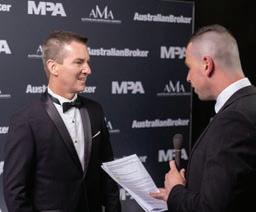











AWARD SPONSORS PREMIUM PARTNERS




EVENT PARTNER PHOTOBOOTH SPONSOR CHAMPAGNE SPONSOR SOCIAL MEDIA SPONSOR


VIP POST AWARDS EVENT SPONSOR ENTERTAINMENT PARTNER





career you have to fight more than normal … where I came from, our cultural background, for women to start their careers, they have to go through many battles.”
Adjusting to life in Australia wasn’t easy at first. Vira says her family knew no one. “I remember in the first one and a half months, my husband booked tickets to go back to India almost three times,” she says with a laugh.
While Vira says she didn’t experience culture shock, the family had to adapt to a different way of living, without the household support they were used to in Mumbai.
Despite having worked in business in India, she says they “started from scratch” in Australia. Vira worked in fashion and jewellery stores before securing a job at Commonwealth Bank in 2011, where her love of maths and strong customer service skills came in handy.
MOVING TO another country, experiencing different cultures and navigating a path to a new career as a successful mortgage broker is no easy task, but Mortgage Choice franchisee Smita Vira has shown it can be done.
Conscious of the opportunities she has been able to take advantage of but also of the barriers that migrant women can face, the Adelaide broker is heavily involved in community programs, and reaches out to help and inspire others.
Originally from Mumbai, India, Vira and her husband and two young daughters migrated to Australia in 2008. After working in the family’s shoe business in India, they decided to move away from the hectic pace of Mumbai, opting for a better family life and greater career opportunities in Australia.
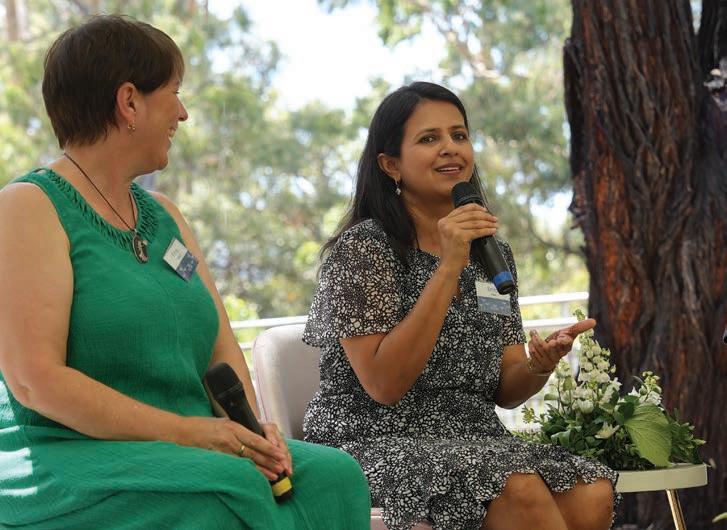
“We wanted to experience something different,” Vira says.
“When you talk about diversity, women are treated a bit differently in India. To start a
She started as a teller and then moved into different roles at CommBank, including home lending, SMSF and business banking. Vira says the skills she picked up at the bank were invaluable when she decided in January 2020 to “start her career in broking”.
Vira set up her own mortgage broking franchise in Adelaide. Now part of Mortgage Choice, her franchise covers the northern Adelaide suburbs of Prospect, Campbelltown, Enfield and Klemzig.
She says her work in the community helped her meet a lot of people, which was helpful
when it came to building her customer base as a broker. Vira is a follower of guru Pujya Shri Rakesh Jhaveri and is involved in supporting the work of his charitable foundation, the Srimad Raj Chandra Mission. Every week, the Adelaide Group runs a spiritual session in Adelaide so people can listen to the words of the guru. “In this crazy world of stress and anxiety, it helps you to cope with a lot of things,” she says.
The group helps provide hot food for the homeless in partnership with Adelaide organisation Cos We Care every Saturday.
Vira is also a sound healer and runs her own not-for-profit organisation, Divinage, which conducts regular activities, including weekly sound healing sessions and monthly mental health programs featuring mandala art, pranayama (breath control exercises) and yoga. It recently supported Catherine House (pictured at right), an organisation in SA that helps homeless women.
“Divinage also buys products from overseas


While a lot of people from the local Indian community attend Vira’s programs, she says word of mouth means that more Australians from different backgrounds are attending, including colleagues and other people in the mortgage and finance industries.
Vira says it’s important as a broker to build connections with the community you serve so customers can see you o er more than just a transactional relationship.
“For anything you do in life, trust is a big factor. [Customers] can be assured that the advice I give is not biased. If it’s my daughter sitting in front of me versus my client, if I’m doing something for my daughter, I’ll 101% do it for my clients.
“This is the kind of attitude and customer service we provide, and it encourages people to put their faith in you.”
Vira says there’s a large Indian community in Adelaide, and it’s beneficial that she’s from Mumbai, a multicultural city, with many di erent languages and customs.

few female brokers. “I strongly promote diversity in this space, and we need to get more women of all cultures taking up a career in broking. There are so many amazing women with so many skills, but they don’t always get the platform or exposure. Every woman has a di erent story and a di erent struggle.”
In February, Vira was a panellist at a Mortgage Choice event run by the Aspire program (pictured on opposite page), which supports and promotes female talent in the broker network.
from not-for-profits and sells them here to create employment for tribal women,” Vira says. “Funds raised from some of our activities are donated to local charities as well as to support kids from the state of Gujarat in India – enrolling them in school and paying their yearly fees.”
One of Vira’s biggest fundraising events was the staging of an Indian play, Yugpurush, in Adelaide in 2016. She says the sold-out event raised funds to help build a hospital in rural India.
“A lot of people in the community knew that I was behind the play and were aware of my activities in the community, so that helped with my branding and recognition as a broker.”
“I can speak almost eight languages, which enables me to connect to di erent people and deeply understand their culture. It helps a lot; people refer others to me. That’s the biggest part – the referral business,” she says.
“Some of our customers call me ‘baji’, which means sister in Hindi.”
While people often know Vira from her community activities, she says it’s not about “talking the talk but walking the walk”.
Many of Vira’s clients are women from di erent cultures. “As soon as they see that you are a woman mortgage broker, that trust is di erent. I get a lot of Afghani Muslim women who come to me for advice.”
Vira says in her community there are very
At the latest Aspire event held in Adelaide in July, leadership strategist and behavioural scientist Shadé Zahrai spoke about diversity and female empowerment.

“It was amazing to hear her. We need more women like her to encourage other women to come forward,” Vira says.
In July, Mortgage Choice won the Diversity & Inclusion award for its Aspire program at the 2023 MFAA National Excellence Awards. The award recognises the work of the teams and brokers involved in shaping the Mortgage Choice Aspire program and e orts to boost representation of women in the network and broking industry.
To learn more about Aspire, the latest events and the exceptional women in the Mortgage Choice network, go to mortgagechoice.com.au/ franchises/aspire.
“I can speak almost eight languages, which enables me to connect to di erent people and deeply understand their culture” Smita Vira, Mortgage Choice
The FBAA has set up a community forum known as The Artemis Space, which is designed to enable women to connect with each other, share their journeys and achieve success in the industry
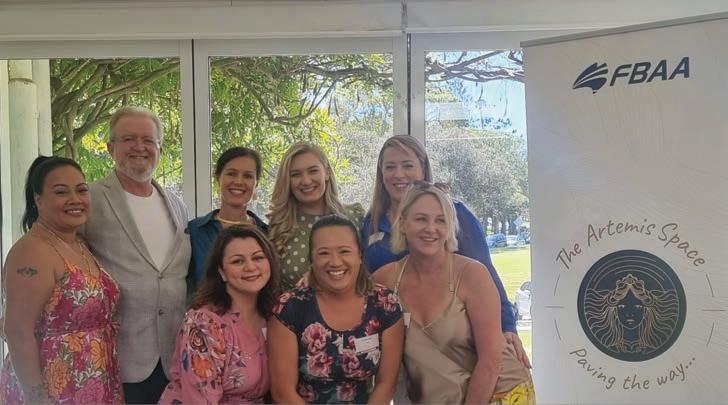
WHEN THE FBAA was looking for someone to lead its new forum for women in the finance industry, Joanna James was the ideal choice.
A highly respected industry leader, entrepreneur and author, James began her career as Australia’s youngest female architect and builder. She then went on to become a successful broker and general manager of mortgage manager and non-bank lender Mortgage Ezy for more than 20 years.

James was also the chief ambassador of global movement The Successful Woman, which empowers women to grow their skills in business.
Now she is overseeing the FBAA’s The Artemis Space. Named after the Greek goddess of nature, women and archery, it symbolises reaching an objective with the greatest speed, accuracy and focus.
FBAA managing director Peter White says he met James and other women in the industry on International Women’s Day in 2022 to discuss bringing about real change for women.
“It certainly isn’t about ‘men are bastards’ or ‘let’s burn the bra’ style of campaigns; it must be driven by purpose and with real, tangible outcomes that are beneficial,” White says. The Artemis Space is based on equality for all and to achieve this “we need to reset the pendulum swing to find that balance and put right the failings of the past that created those inequalities”.
“So, with a like-minded group led by women, The Artemis Space was born, and I felt Joanna would be the right person to lead this for the FBAA, and we march on from here,” White says.
After a full year of research into the concerns of women, The Artemis Space was
officially launched on International Women’s Day 2023.
James says, “Here we presented our vision to create a safe and supportive community where women/womxn can have open-minded, matter-of-fact discussions to understand what holds them back in order to pave the
“This program supports women to better advocate for themselves, which is the most powerful position of all”
Joanna James, The Artemis Space
Sponsored by
way forward.” The Artemis Space’s mission is to transform constructive discussions into practical change while supporting women/ womxn to connect, grow and succeed with excellence in the finance industry.
“We choose to focus on practical solutions at a grassroots level across three main areas: awareness, education and advocacy,” James explains. “The team of forum contributors are first class, choosing to serve others without pretence or parade.”
In the awareness series, a di erent expert each month focuses on enhancing skills that heighten self-awareness.


“Streamed live into the Facebook group, we cover topics such as creating work-life balance, managing time, improving focus, setting boundaries, achieving goals, developing discipline and mastering emotions, to name just a few,” James says.
The recordings also form a resource library of easy-to-digest 30-minute segments that support women in different times of need.
Each quarter, The Artemis Space holds education forums focusing on specific areas of upskilling not covered by traditional avenues. This year, topics include “Essentials in Business – Planning for the New Financial Year Ahead”; “Confidence in Communication”; and “All Things Networking”. Each 90-minute forum features two speakers who share valuable knowledge and practical tools.
For the advocacy program, James says The Artemis Space identified the need for an enhanced network of mentors to help women make progress across many areas of their careers.
“In essence, this program supports women to better advocate for themselves, which is the most powerful position of all. The Artemis Space has partnered with [mentoring program] Rare Birds in providing access to quality, ongoing business mentoring from top-level business professionals predominantly outside of the industry to give a di erent perspective to their growth.”
The community also hosts regular walking meet-ups in each state, and forum members attend industry conferences and events.
“They say large oak trees grow from little acorns, so this year we plan on planting that seed, growing to 500 members by focusing on delivery quality over quantity,” James says.
“At The Artemis Space we aim to keep things real, personal, and applied at an individual level.”
James says it’s vital that women have a supportive forum “where we are able to share our journeys”.
“Where we can feel free to be open and honest about the challenges we face, as well as a space where we can celebrate each other, is key to having a balanced life within the industry.
“Many women juggle personal, family and professional needs, and it’s usually in the intersection of these areas that both the joy and the difficulties reside. Being able to share constructive tools and extend genuine support and encouragement can
a former back-up singer for Tina Turner who James met in the US last year.
“Robbie, now 83, is sharp as a tack, rocking her wardrobe like a boss in heels,” James says. “She actively owns two di erent businesses, and yet she still finds time to share her valu-
make all the di erence to how we navigate these obstacles.”
As women learn to collaborate and support one another, “we actively break down the barriers inherent in competition and exclusion”, James says.
“Connecting in this way is the fastest pathway to sustainable growth on all levels within the industry.”
James says she has met many amazing women from across the world. “Each unique in their talents and gifts, I take inspiration from them all. If I were to focus on a particular group of women who excite me, it is women who are over 70 who choose to contribute in a constructive and meaningful way.”
One of these women is Robbie Montgomery,
able insights about life with other women.
“Robbie is an example of a woman who is vibrant, fully alive, generously sharing her wisdom with others. Forget preconceived ideas about ageism or working-life expiry. That is something we can all aspire to.”
James says that as a passionate advocate for the advancement of women, she loves the inclusive and collaborative nature of The Artemis Space. “It serves as a beacon for more women to achieve excellence within the finance industry, illuminating a new path forward.”
Women are encouraged to connect with The Artemis Space by joining its Facebook group. Membership is free and is open women and men across the industry.
“We need to reset the pendulum and put right the failings of the past that created inequalities” Peter White, FBAA
OnDeck has been declared Australia’s 2023 Best Place to Work among businesses with less than 100 employees, beating 55 other companies in the same category.
The award was bestowed by WRK+ and was based chiefly on the results of a survey completed by over 43,000 employees across 101 companies nationally.
In today’s environment of record-low unemployment coupled with a skills shortage, no employer can afford to take a business-asusual approach to attracting and retaining quality staff.
It’s also of benefit to businesses to reflect on current recruitment practices to see where they can do better. Participating in the Best Place to Work survey allowed OnDeck to do this.
More than 93% of OnDeck employees participated in the Best Place to Work survey, with strong results across several metrics. OnDeck’s employees celebrated the achievement of their company being recognised as the Best Place to Work.
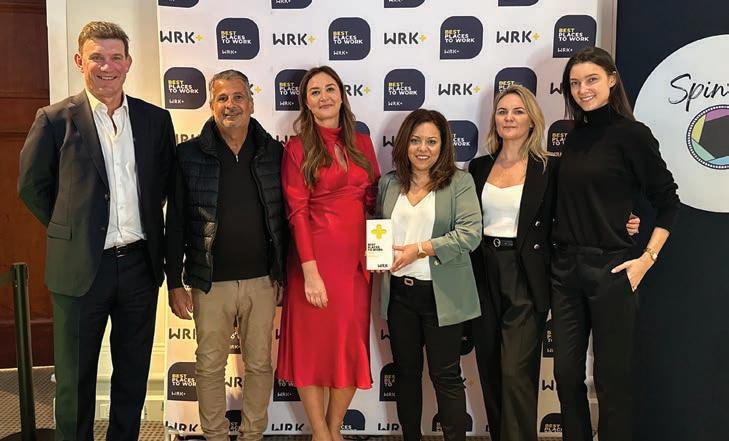
As a lender that’s a pioneer when it comes to being data-driven, OnDeck conducts regular mini pulse surveys and participates in the independent Best Place to Work Study to measure employee satisfaction and engagement.
“As a small business lender, we understand the need to have a strong and dedicated
team to support our small business clients and broker network,” says OnDeck Australia CEO Cameron Poolman.
He believes one of the factors that set OnDeck’s workplace apart is authenticity. Poolman says the lender genuinely cares about its staff and has achieved considerable success in aligning employees with business goals. “This has allowed us to successfully give all our employees a shared sense of purpose, even amid a difficult economic climate,” he says.
Values play a pivotal role in fostering a thriving workplace culture, and underpin how teams interact with each other and their customers.
“We really are very strongly aligned to our values as a business, and they are absolutely not just words on the wall,” says Cherie Habashi, head of people and culture at OnDeck. “In fact, 97% of our team agreed that OnDeck’s leadership team is true to the company’s values.”
Each month, the OnDeck team nominate
people they believe have lived the company’s values. The executive team review each nomination to determine a monthly winner. The winner is then announced at a Town Hall meeting, receives a prize and goes into the running for an annual award.
That said, it’s important that employees understand the company’s goals and how their roles contribute to achieving these goals. The rise of presenteeism in the workplace – employees who turn up but are not engaged – is often a function of teams not understanding the ‘why’ behind what they are doing.
“We launch our goals for each half via ‘OnReview’,” Habashi says. “Following this, each team member sets their own individual goals. This allows everyone to set personal goals that align with our broader company goals.”
The process is proving e ective, with 95% of the OnDeck team reporting that they can see a clear link between their work and the company’s goals and objectives.
“We take this process very seriously and from the top down always ensure our goals fundamentally serve our vision – to set the standard for small business lending,” Poolman says.

Just as strong as its value orientation is its leadership support: 97% of OnDeck’s team agree that the lender’s leadership team are competent at running the business.
“We celebrate wins and consistently and respectfully challenge our team to do better for our customers,” Habashi says.
From its earliest beginnings, OnDeck’s ethos has always been to put its people first, and part of this involves having a strong emphasis on communication within the business. Every month at a Town Hall, the CEO answers all questions that have been submitted anonymously by the team that month – questions are not filtered, and nothing is o -limits.
Habashi says OnDeck provides very clear communication when things are good, as well as when things are more challenging. “This
allows our team to understand the business decisions we make.”
Further communication is shared through regular ‘team huddles’, and major business initiatives are shared with employees via ‘Switched-On’ announcements.
Poolman says a further strength is OnDeck’s team culture, with 90% of employees agreeing the lender has a team spirit.
“They feel they can be themselves, and that diversity of backgrounds, talents and
perspectives is encouraged by the organisation,” he says.
“When we say our people are our greatest asset, we mean it. So we engage in anonymous external audits to keep ourselves honest in terms of how well our people are really engaged – and if we are doing right by them.
“Our people really are the foundation of how we are able to be a strong lender to small businesses and our broker partners.”
OnDeck is working hard to bring gender diversity to the business – and the broader industry. A few of the steps the lender has implemented can be applied to every business. These initiatives include:
O ering work flexibility and a hybrid work environment
Providing a private room where breastfeeding women can pump in a comfortable space
Providing paid parental leave (for both the primary and secondary carer) above the statutory entitlement
Conducting annual salary benchmarking and internal pay audits to ensure pay parity
Proactively developing and implementing compulsory leadership training to ensure the respect@work reforms are incorporated into the organisation
Providing an anonymous reporting line to ensure all workplace concerns can be voiced if someone doesn’t want to be identified
Results at OnDeck:
Women fill 40% of leadership roles
One in three roles across the business are held by women; by comparison, the proportion is closer to 20% in the fintech industry
“As a small business lender, we understand the need to have a strong and dedicated team to support our small business clients and broker network”
Cameron Poolman, OnDeck
IT’S BEEN almost a year since Anja Pannek was appointed CEO of the MFAA.
Speaking to MPA in September 2022, Pannek said she wanted people to actively think of mortgage broking as a “career of choice”, and diversity and inclusion played a big part in this. Fast-forward almost 12 months and she says that while progress has been made on D&I, more needs to be done.
The MFAA Industry Intelligence Service 15th Edition report shows that the proportion of female brokers is at 25.4% – the lowest on record.
“We clearly have work to do as an industry,” Pannek says. “The results aren’t on par with the broader Australian community and are below what’s reported for financial services more broadly.
“We’ve seen a significant, and positive, shift in how diversity and inclusion overall is viewed in our industry. The awareness is there, and the industry is in a position to be able to unlock the enormous potential of the talent pool out there, but we aren’t there yet.”
Pannek says consideration of gender diversity as well as overall diversity is an issue “we at the MFAA feel needs to remain front and centre for us all”.
“We should be striving for our industry to reflect the community it represents and be a

nurturing environment, welcoming to people from all walks of life, regardless of background.
“A great attribute of Australia is our diversity, and our industry needs to reflect this diversity in all forms, whether it be gender, sexuality, cultural and linguistic diversity, or disability, and so on. We need to show clients that we represent them, we understand them, we want them to reach their goals.”
to call out behaviour that is not supportive of females and other diverse groups in our industry and protect those who do speak up,” Pannek says.
“The commercial business case for diversity is clear and compelling – quite simply, it’s good for business”.
Research backs this argument up time and time again, Pannek says. The Diversity Council
While gender pay inequality exists in other industries, there are clear benefits for women who seek a career in mortgage and finance, Pannek says. “There is no pay differential, something that can be highlighted to attract new talent.”
The MFAA is keen to celebrate those who are taking action to support greater diversity and inclusion. “But most importantly, we need
of Australia’s Inclusion@Work Index 2019–2020 found that workers in inclusive organisational structures were three times less likely to leave their current employer.
“So it’s important for businesses who want to retain their staff to be welcoming and inclusive, but it’s also about clients – the homebuyers and business owners looking for the support a mortgage and finance broker provides.”
The MFAA is working hard to encourage more women to become brokers through several industry initiatives and by lobbying the federal government
“We should be striving for our industry to reflect the community it represents and be a nurturing environment, welcoming to people from all walks of life, regardless of background” Anja Pannek, MFAA
For many people, having a broker they can relate to, or who they feel understands them, is important, “for example, people whose first language isn’t English”, Pannek says. “And the 2021 Census showed that almost six million Australians use a language other than English at home; having someone they can talk to in their native language can be extremely comforting.”
Brokerages that have multilingual sta can boost client relationships, providing opportunities not only to reach a new pool of clients but also for “wonderful career development for these sta ”.
Pannek says people with disabilities may also be looking for a broker who is respectful and accommodating of their circumstances and needs.
For some clients, particularly women, working with a broker of the same gender may also be important.
CoreLogic research shows that 26.8% of dwellings are female-owned, and if dwellings owned jointly by females and males are also considered, females own more than 70% of properties in Australia.
“Females are making household financial decisions; they have their own goals and they, quite rightly, expect to be taken seriously and treated with respect,” Pannek says.
The MFAA’s key platform for boosting female broker participation is its industry-leading Opportunities for Women initiative, established in 2018.

Pannek says the MFAA has consistently put the spotlight on the issue, bringing it to the attention of decision-makers and producing data to support the industry to take action. Its annual Diversity and Inclusion survey revealed a narrowing perception gap when it comes to the di erences in the experiences of men and women; and a greater willingness to promote the mortgage and finance broking industry to diverse individuals.
The MFAA provides a range of resources to assist people in bringing diversity into their businesses, including the published

MFAA Opportunities for Women reports: www.mfaa.com.au/professional-development/research/opportunitiesforwomen Inclusive community hub: www.mfaa.com.au/inclusive-community-hub
Mental health and wellbeing hub: www.mfaa.com.au/mental-health-and-wellbeing Balancing Work, Life and Everything Else e-book: www.mfaa.com.au/balancing-work-life-and-everything-else
Champions of Diversity series, which showcases how individuals demonstrate leadership in their e orts to create a more diverse and inclusive industry.
The MFAA has also launched an ‘inclusive community hub’ featuring online resources and information about diversity, including tools to “improve hiring practices and identify our unconscious biases”.
The association’s Women in Finance Broking networking events give women as well as men an opportunity to support broader diversity and inclusion.
The MFAA has also made a number of recommendations to the federal government’s Employment Whitepaper – Equal Opportunities for Women and Labour Force Participation.
Pannek says the Australian government
wants to be a world leader in gender equality, a goal the MFAA supports. The association’s submission to the Employment Whitepaper outlines how it believes the government can assist the industry in achieving this goal. Its recommendations include investing in female-led small broking businesses so they can grow and scale.
Federal and state financial support programs can also be a significant tool to facilitate entry or re-entry of women into our industry, Pannek says.
“Our members have told us they value the financial assistance of government-sponsored pathways programs as a key opportunity to help them take on and train new female sta members in a variety of roles, giving them the opportunity to grow and progress to becoming a broker themselves.”
As a major bank that values diversity and inclusion, NAB is supporting and empowering its lesbian, gay, bisexual, transgender and intersex (LGBTI+) employees and customers through the strong work and advocacy of NAB Pride
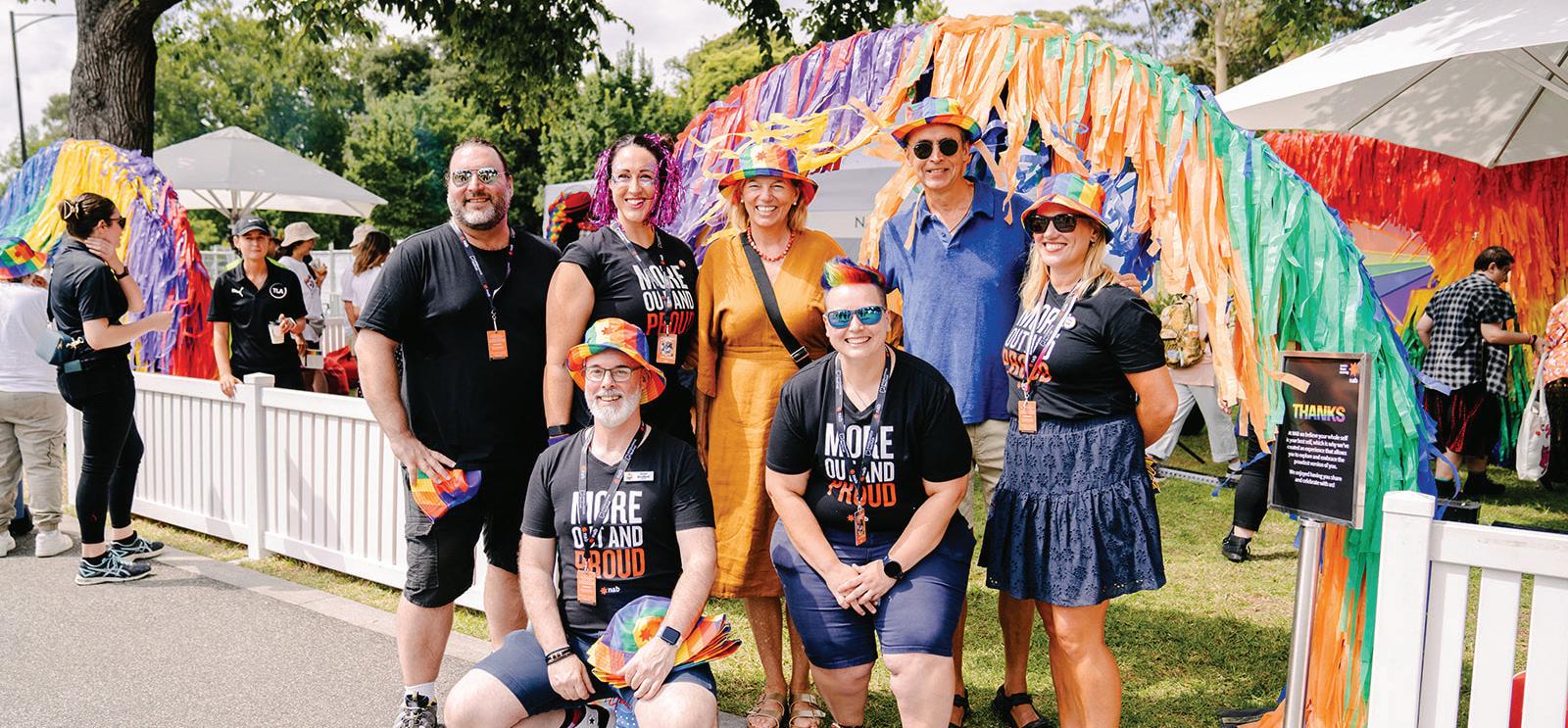
ONE OF Australia’s largest banks, with more than 32,000 staff, NAB understands the importance of fostering a welcoming and inclusive workplace. One of the ways it does this is through its support of LGBTI+ employees and customers.
NAB Pride executive co-sponsor and group executive, personal banking, Rachel Slade says NAB Pride is the bank’s dedicated LGBTI+ employee resource group
comprised of passionate volunteers and a strong network who drive a safe and inclusive workplace for LGBTI+ colleagues and their allies.
“The purpose of this employee resource group is to be the voice of LGBTI+ colleagues and customers by raising awareness and advocating for a safe, inclusive workplace and experience,” Slade says. “The group provides networking, mentoring and educational oppor-
tunities, as well as helping to build diverse talent pipelines.”
Slade says diversity is deeply valued at NAB, not just by its dedicated employee resource groups but right across the bank.
“We have more than 32,000 colleagues, and across our organisation we have a huge wealth of experience, beliefs and backgrounds.
“We see it as our job to nurture a safe and inclusive workplace that celebrates the diver-
sity of our people and empowers them to be a voice in the community. We believe that when you fully embrace who you are and can be your whole self, you will thrive.”
Slade shares the same commitment to NAB’s more than 8.5 million customers, “making sure they are respected and valued for who they are, no matter how they identify”.
“Overall, we’re intent on building a culture based on trust and respect that we can all be proud of, where each of our colleagues feels appreciated and empowered to be their authentic self.”
NAB Pride supports this goal through activities such as hosting networking events for NAB Pride members and allies, running seminars and providing training and awareness sessions for employees.
As well as promoting an inclusive and welcoming workplace for colleagues and customers, NAB actively promotes big events on the LGBTI+ calendar, Slade says. Some of the key events it supports each year include International Transgender Day of Visibility; International Day Against Homophobia, Transphobia and Biphobia (IDAHOBIT); Wear it Purple Day in support of LGBTI+ youth; Pride Month Australia; and World AIDS Day.
NAB is also the proud partner of Pride Cup, an organisation dedicated to changing sporting culture so that LGBTI+ people feel safe, welcome and accepted.
Slade says the bank has been a passionate supporter and principal partner of the Midsumma Festival (pictured on opposite page) for more than 10 years.
The Midsumma Festival started out as a Melbourne-focused LGBTI+ community event and is now recognised internationally.
“The festival includes a wonderfully diverse program of arts, culture and community events, and connects people in person and virtually via streamed online events that are accessed right across the world,” Slade says.
“NAB’s role as principal sponsor sends a clear message to our diverse colleagues and the community that they have every opportunity to share their true selves.”
The major bank is also a member of Pride in Diversity, Australia’s only not-for-profit workplace program supporting the country’s employers with LGBTI+ inclusion.
In 2022, NAB achieved Platinum Tier employer status in the Australian Workplace Equality Index (AWEI), Australia’s national benchmarking instrument for LGBTI+ workplace inclusion, Slade says.

“As a Platinum organisation, NAB is one of only 12 organisations nationally to achieve this level of workplace inclusion, and this achievement is a testament to our ongoing dedication to creating a workplace where we all belong and are all welcome.
“Most importantly, this reflects upon everyone at NAB and celebrates us as a vibrant and diverse team.”

NAB plays a role in supporting the LGBTI+ community more widely by helping other organisations connect with LGBTI+ networks in business and across the broader community.
“Our commitment to inclusion and diversity also applies to the relationships we have with industry partners,” Slade says.
“We use our status as an AWEI Platinum Tier employer to influence and educate organisations about the importance of building an inclusive and welcoming workplace for colleagues and customers.”
“We believe that when you fully embrace who you are and can be your whole self, you will thrive” Rachel Slade, NAB
Resolve Finance broker and SFG member Niti Bhargava has drawn on her own experiences as a migrant to set up a financial literacy program for women
AFTER MIGRATING from India to Australia in 2007, one of the most stressful experiences for Niti Bhargava and her husband was buying their first home.
Now a successful mortgage broker at Melbourne’s Resolve Finance and a member of broker aggregator Specialist Finance Group, Bhargava reflects on the situation at the time.
“We did not sleep for nights,” she says. “We were making such a big decision without our immediate family’s presence and guidance. We definitely felt that there was no proper guidance available.”
Luckily, everything went well with the home loan, Bhargava says.
“Not until I started working in banking myself did I realise that there are thousands of customers out there who are feeling exactly the same way we felt.”
Motivated by her experience, Bhargava has set up a financial literacy program to educate recent migrant women about their finances, wealth management and how to better equip themselves for the future. The program is a mix of online and face-to-face workshops. The most recent workshop was held in the Melbourne suburb of Caroline Springs and supported by the Victoria MP for Kororoit, Luba Grigorovitch.
Bhargava grew up as the eldest child in a middle-class family in northern India and says
she was a sincere and responsible child who excelled in school and college and in extracurricular activities such as public speaking and debates.
She completed two master’s degrees in India and got married at 21, before migrating to Australia in 2007 on a student visa, seeking a better future in a “land of opportunities”.
of challenges, including having her qualifications recognised; facing difficulties with language and communication; and being “picked up many times for my different accent”.
“But I was ready to accept this challenge because I knew my work should speak louder than any words … it took me couple
“My grandfather always used to teach me two things: one, it takes only one person to break the line and excel in every single opportunity, and two, you should always earn your own money and feel the power of financial freedom,” Bhargava says.
“Regardless of your gender, you need to learn to be financially independent asap – it’s an essential life skill.”
Bhargava got her start in finance working as a relief bank teller at one of Australia’s big four banks. She says she faced a number

of months to realise that the systems are different here, and job selection is not based on your degrees only but practical experience is way more important.”
Adjusting to Australian culture was also a challenge, Bhargava says, and for a time she felt homesick, missing India’s colourful festivals.
“The best thing about staying in Australia is that there are so many different cultures around you that before you realise it, you are already loving other cultures, respecting
“I have faced scenarios like women going through domestic violence and financial abuse – this accelerated my plans for a financial literacy program”
Niti Bhargava, Resolve Finance
their values and becoming part of the other festivities,” she says.
Bhargava has progressed in her career from teller to home loan consultant, and she says she was fortunate to receive worldclass training.
“I have not only gained practical experience, customer service skills and advanced training in lending and finance, but also learnt soft skills like cultural adaptability, gender equality and workplace inclusivity.”
She says these skills were invaluable when she started working as a broker three years ago.
“As an ex-banker I brought a solid foundation of financial knowledge to my role as broker, allowing me to understand a client’s financial situation comprehensively … e ective communication skills gained from banking helped me explain financial concepts clearly to my clients, empowering them to make informed decisions.”
Bhargava began marketing herself as a broker via social media during the COVID pandemic. She says this enabled her to connect with di erent communities, clients and a diverse range of women.
“I have faced scenarios like women going through domestic violence, mental health and wellbeing [problems] and financial abuse. Experiences like these helped accelerate my
plans to set up a financial literacy program.”
Workshops were run via Zoom and other online formats, and broadcast on radio, but Bhargava says this year she has been able to run in-person workshops (pictured below) with the help of Grigorovitch.

“I have also been supporting women empowerment-based programs and social events financially,” Bhargava says. “These are all community programs where issues such as gender equality, female participation in finance and cultural restrictions on women are addressed.”
As a big supporter of women in sport, the broker also organised “Our Girls Our Pride” on Facebook in March to honour young girls who excel in sports and entertainment.
When it comes to the financial literacy program, Bhargava says some of the challenges include both time and cultural restrictions, as well as di culties “generating the interest of women, language barriers and hesitation”.
“But we are working continuously to keep our motives alive and educate as many migrated people as we can.”
Bhargava, who speaks Hindi, Urdu and Punjabi, says it can be highly beneficial for customers to connect with a broker who shares a similar background.

Try to understand the specific needs, challenges and cultural backgrounds of the targeted community
O er multilingual resources to cross the language barrier
Adopt a culturally sensitive approach Collaborate with community leaders and other local businesses
Focus on empowering participants, and measure impact
“There is a language and cultural understanding, and you can clarify complex financial concepts and processes, reducing miscommunication. Empathy and relatability create a stronger sense of trust and rapport … this also enhances chances of higher referral opportunities once trust is built.”
Bhargava encourages other brokers to run financial literacy programs for multicultural communities, saying it can help boost their business growth.
SFG provides an immensely supportive company culture that encourages brokers to actively participate in community outreach, she says. “Recognising and celebrating my e orts in last year’s annual conference has definitely been a great source of motivation and commitment for me to increase my e orts in engaging with the community.”
Digital tools provided by SFG help brokers engage their targeted community and provide useful data and insights.
“I’m a big fan of their continuous support, especially for financial literacy programs and for my ‘breast cancer events’ throughout the year. They are always a call away. I feel fortunate to be part of the group,” Bhargava says.
DEVELOPING THE right people for the right role at the right time – this sums up the aim of Pathways, Lendi Group’s industryleading broker recruitment and development program.
Matthew Whyte, Lendi Group’s general manager, national distribution growth, says the aim of Pathways is really simple. “It’s leveraging our multibrand, multichannel
right through to franchise opportunities, “or what we would call [being] the CEO of their own business”.
“Having a structured Pathways program in place will ensure we are setting up our brokers for success, transitioning them into the business model that best suits their professional and personal goals and requirements,” he says.
manager before moving into his current role as GM of distribution growth five years ago.
“I’ve been very fortunate to have had some fantastic mentors during this time, who focused just as much attention and conversation around growth and development as around the work itself,” Whyte says.
“Personal growth is the first step in professional growth, and the two are not mutually exclusive, so my advice is to align yourself with mentors that can provide support in both areas.”
Whyte says that while Aussie and Lendi provide different experiences, ultimately “they have a shared desire of seeing things done differently for brokers and customers alike”.
“When these brands merged two years ago, they brought together a raft of complementary capabilities, unlocking key benefits for our brokers. One of the major benefits is our multichannel model and the sheer breadth of opportunities this provides for brokers to build a business or career in a manner that suits them.”
Through Pathways, many brokers have progressed within the same brand, Whyte says, whether these were Lendi associates being promoted to Lendi home loan specialists, or Aussie store or mobile brokers becoming store owners and franchisees.
“Our Pathways program is now entering a new phase to provide further opportunities to our expanded network of 1,400 brokers.”
model by having the framework in place to attract, recruit, develop and progress the right people for the right role at the right time.”
Following the merger of Aussie and Lendi, Whyte says a range of roles are now available across the group, from salaried broker and independent contractor roles
Whyte knows a thing or two about the best way to develop a broker’s career. He’s been in the mortgage industry for almost 25 years, since starting as a broker in the late 1990s at Wizard, after which he progressed through a range of sales and sales leadership roles.

He’s been at Aussie for 17 of those years, five of which he spent as Queensland state
Whyte says Aussie brokers have had many opportunities to learn about the Lendi brand and vice versa. “There’s been an increase in enquiry around transitioning across brands – in particular, Lendi brokers looking to build increased scale by becoming Aussie franchisees.”
He says now that the work to migrate the Aussie network onto the new Aussie Platform and consolidate operating models across the group is complete, it’s a logical time to develop the next stage of Pathways through collaboration and consultation with brokers groupwide.
Lendi Group’s multibrand, multichannel approach to broking is supported by its state-of-the-art training and development Pathways program
“Our Pathways program is now entering a new phase to provide further opportunities to our expanded network of 1,400 brokers”
Matthew Whyte, Lendi Group
Due to be finalised in September 2023, the next phase will include a framework for cross-brand channel transitions and will outline important logistical considerations and capability indicators for channel movement as a broker achieves significant growth or their needs evolve.
The Pathways program has di erent tailored components that cater to a broad spectrum of requirements and appeal to brokers at di erent stages in their journey. Lendi Group has five di erent broker channels:
• Lendi and Domain home loan specialist: salaried brokers who are employed directly by Lendi Group and can work remotely or in a Lendi Group o ce
• Lendi home loan consultant: selfemployed, independent contractor brokers who primarily transact with customers virtually via phone, email and video chat
• Aussie mobile broker: self-employed, independent contractor brokers who meet customers face-to-face or virtually

• Aussie store broker: self-employed and salaried opportunities available across
225+ stores; employed by or contracted to franchisees
• Aussie franchisee: the ultimate opportunity to build scale. The franchise model empowers franchisees to be the CEOs of their own businesses
Some of the programs helping Lendi Group brokers enter and thrive within the mortgage industry include:
Graduate program
• This is the starting point for all brokers joining the group; it provides them with world-class support via a comprehensive eight-week course.
• New-to-industry brokers on this program are achieving outstanding results, with graduates averaging eight lodgements in their first eight weeks. Some new brokers are on track for over $50m in settlements in their first year.
• Associates make contact with new and re-engaged company-generated leads, guiding them through a prequalification
Name: Alexander White, Lendi elite home loan specialist

When did you join Lendi?
I started as a Lendi associate in July 2020 and transitioned into a home loan specialist role in January 2021.
What was your professional background prior to joining Lendi Group?
I worked part-time in commercial real estate while completing a double bachelor’s degree in commerce and global business.
How did the training and support provided by Lendi Group set you up for fast success?
The associate role provided me with an opportunity to develop preliminary sales skills and learn credit knowledge, which was new territory for me.
How did the transition from associate to home loan specialist arise, and how did your associate experience help you succeed in your new role?

I felt I had gained solid sales skills and a good understanding of credit, and was ready to pursue new opportunities to develop both personally and professionally within Lendi Group. The strong foundation I built as an associate helped me find my feet quickly as a home loan specialist, and this new role has opened opportunities to develop in new areas like pipeline management and business operations.
What are your proudest achievements at Lendi Group?
Becoming one of the fastest brokers in Lendi history to be promoted to the role of elite home loan specialist is a definite highlight. I’m also proud to have a spot in Lendi Group’s Signature program, which recognises the top-performing brokers across the entire network.
process and directing qualified customers into a broker appointment or a nurture journey until they are ready to transact.
• Associates are direct employees of Lendi Group and are typically young graduates looking for experience in the finance industry or mortgage broking space.

• Associates gain valuable sales skills and a thorough understanding of the home loan process.
• Many associates ultimately transition into more senior roles within the group, and some leading home loan specialists started as associates.
Whyte says Lendi Group’s broker education strategy aims to provide targeted skills training supported by on-the-job coaching and development, including online and face-to-face group training sessions, as well as networking opportunities through monthly All Hands sessions, quarterly Broker Business Forums and biannual Lendi Group conferences.
“We pride ourselves on the industryleading training and support we o er to our brokers,” he says.
“Our training, systems and processes have been purposefully developed to facili-
Name:
Melanie Smith, senior Aussie mobile broker. Opened her first store as franchisee in late 2023
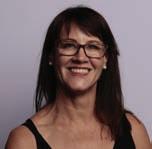
When did you join Aussie?
I joined Aussie as a mobile broker in 2010.
What was your background prior to joining Aussie?
I’d recently been retrenched from a role in agribusiness while I was at home with my first newborn. Shortly after, I started working for a financial planner before I fell pregnant with my second child.
• This is an industry-leading recognition program reserved for the top 25% of brokers in the network. The program identifies high-performing brokers and provides access to additional opportunities that are designed to further elevate business success.
• Through Signature, the highestperforming brokers receive world-class opportunities, including access to coaching; marketing and strategy tools; personal development sessions led by renowned educators; and unique, money-can’t-buy events and experiences.
• The brokers also vie for a coveted place in the Signature Platinum cohort – a prestigious honour reserved for the top 2% of the network – giving them further opportunities, including the chance to participate in international study tours.
tate the development of thriving broker businesses.”
Store brokers benefit from being mentored by their franchisees, while all brokers have the support of their sales leaders and learning and capability team, Whyte says.

“Some of our most successful franchisees originally started as store brokers. It’s also common for store brokers to work towards equity partnership with their franchisee.
“From the beginning of the recruitment process and throughout a broker’s journey with us, key stakeholders work closely with them to identify their goals and support them on their journey.”
Whyte says that whether brokers are new to the industry or established brokers wanting to scale new heights, Lendi Group o ers the right channel, technology and support model to help them achieve their goals.

What compelled you to join Aussie? After I had my two kids, I wanted to work for myself but have the backing of quality support and a well-known brand. I started doing my research and landed upon Aussie – the brand is gold, the support system is comprehensive, and it’s a business that allows you to be yourself and thrive.
How has Aussie’s training and support helped you build your business?
Aussie supplies qualified leads and also supports admin and lodgement. I have time to focus on dollar-productive activities, self-sourcing and having meaningful interactions with my customers. Aussie’s model has allowed me to be my own boss. With the recognisable Aussie brand behind me, I’ve used this as a launchpad to build my own brand in my community.
What drew you to the Aussie franchise opportunity, and why now? I first became a broker because my kids were very young, and I wanted to work from home and be flexible for them. Now that they’re teenagers, I want to be able to grow my business with the same level of dedication I gave to my family. Opening my own Aussie franchise is an opportunity to build scale and tap into new growth.
“Our training, systems and processes have been purposefully developed to facilitate the development of thriving broker businesses”
Matthew Whyte, Lendi Group


Working together with brokers, aggregators, lenders and service providers, the MFAA’s Opportunities for Women program has been developed to promote greater industry inclusion for women. The Opportunities for Women reports offer insights into the industry and proposed recommendations to assist the broker community to embrace greater diversity and inclusion.

Major sponsors:
Supporting sponsors:


















Resilience, caution and optimism – these are the words that commercial lenders, brokers and aggregators have used to sum up the current state of commercial lending. Leading industry figures attending MPA’s recent Commercial Lenders Roundtable discussed some of the economic challenges but said demand for commercial finance remained strong, with plenty of opportunities for brokers to assist their clients
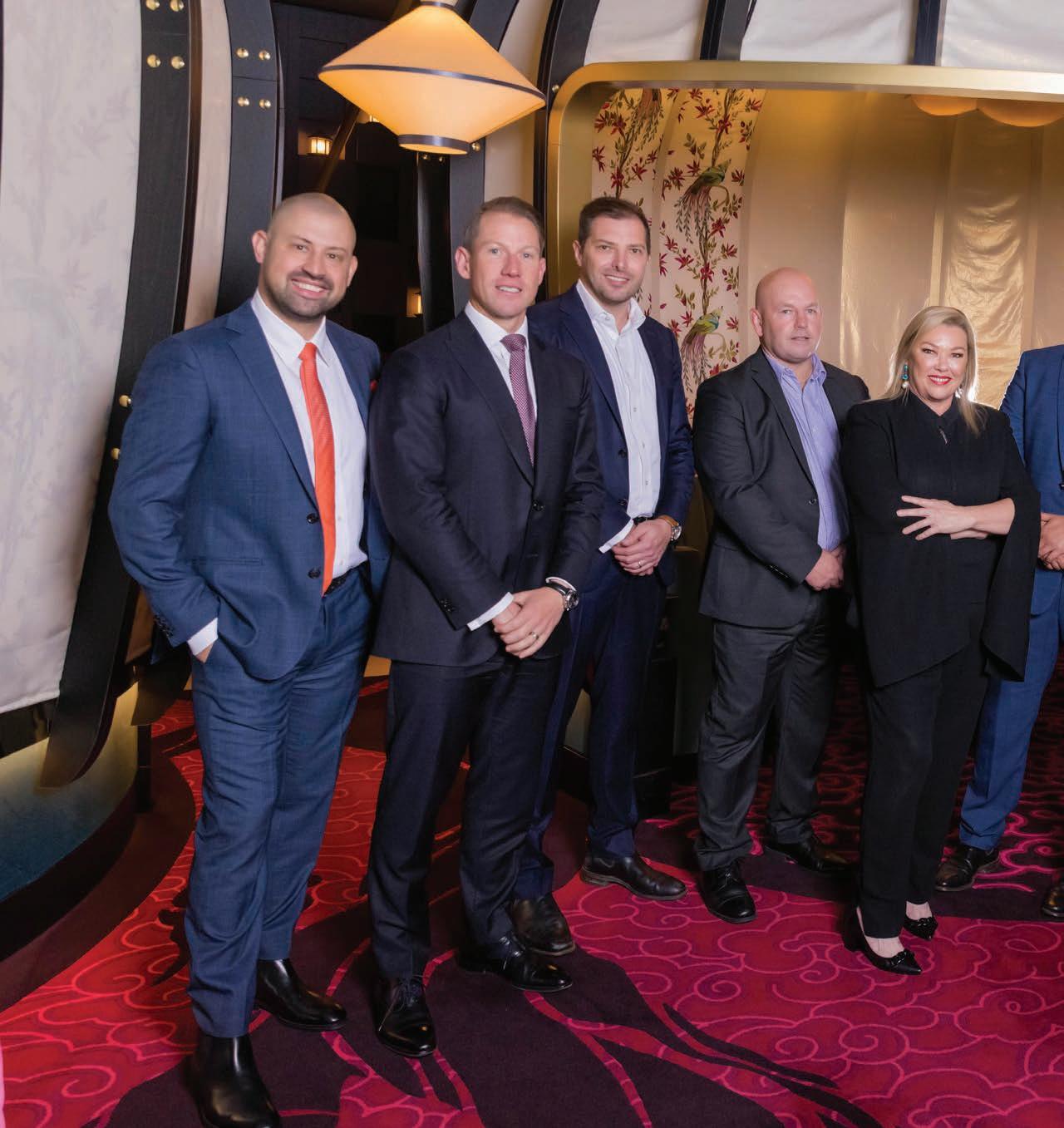
AUSTRALIA’S ECONOMY is like a boxer that’s been knocked down a number of times but refuses to give up. Battered by the heavy blows of the pandemic, which brought lockdowns, job losses and business closures, the economy rallied post-COVID as consumer spending grew, travel and immigration increased and the cheap cost of capital drove demand for loans. Then it was back on the ropes again as the invasion of Ukraine; rising interest rates and inflation; higher supply chain problems and labour shortages hit hard.

While the economy may be down, it’s definitely not out. When it comes to commercial lending, the sector has taken its fair share of jabs, but it’s bouncing back, according to leading commercial lenders, a commercial aggregator and brokers who attended MPA’s annual Commercial Lending Roundtable at Crown Sydney’s Silks restaurant.
Participants included Cory Bannister, senior vice president and chief lending o cer, La Trobe Financial; Karen Carter, general manager, commercial third party, BOQ Business; Anita Hyde, former head of specialised and private, commercial broker, NAB; Ryan Harkness, managing director, ORDE Financial; Michael Moloney, general manager, Resimac Asset Finance; Barry Saoud, general manager mortgage and commercial lending, Pepper Money; and Stephen Scahill, group executive commercial, LMG. Representing brokers were Jean-Pierre Gortan, managing director of Simplicity Loans & Advisory, and Sukhi Singh, director of Infinity Finance Solutions.
Among the issues discussed were the e ects of higher inflation, interest rates, supply chain problems and other challenges on commercial lending; how SME finance, asset finance and commercial property were faring; the opportunities for brokers; diversification; and future growth areas in commercial finance.







What shape is the commercial lending sector in, and how is it being affected by rising interest rates, inflation, supply chain issues and other challenges?
Michael Moloney of Resimac Asset Finance started the conversation by focusing on asset and equipment finance. He said SMEs were in a good position.
“They’ve certainly got their eye on what’s happening over the horizon with rates and unemployment, but from an SME lending perspective, we believe they’re in good shape,” Moloney said. “We’re not really seeing supply chain issues as such an issue these days.”
He said the latest ABS data showed that private new capital expenditure was higher in the March 2023 quarter than one year prior in March quarter 2022.
last year, and “there may be less demand for inventory finance this coming year”.
“Despite immigration rising and not as much demand, there are still sta shortages playing out,” she said. “We do expect there will be a bit of a downturn in business lending for the next few months while people restock and wait for interest rates to settle.”
Pepper Money’s Barry Saoud agreed with the term “cautiously optimistic” but said the concern now was about the rising cost of capital. “With 12 interest rate increases in such a short space of time, I think it’s going to put significant pressure on some of the SMEs looking forward,” he said. “Couple that together with some of the wage increases and the cost of goods, I think that’s a concern.”
However, Saoud said small businesses were very resilient and would pivot and look

“We’re reasonably buoyant about that, but we accept that there are headwinds on the consumer side,” Moloney said. “We’re well aware that the cost of capital has gone up, so we’re certainly looking at the timing of equipment [purchases] and the cost, but overall things are generally positive.”
Anita Hyde said that at NAB “we’re cautiously optimistic about the commercial lending sector and the economy more broadly, but we’re seeing emerging pockets of concern”.
She said there had been a pullback in discretionary spending on household furniture and electronics, and more broadly from branded goods to market goods that were available. “So while we’re seeing consumption growth slow, the economy outlook more broadly remains resilient.”
Karen Carter said BOQ Business had seen businesses rebuilding their inventory over the


at di erent parts of their business to thrive. “They’ve got to look at what are the opportunities out in the marketplace while the economy is quite strong and take advantage where they can.”
Asked if he’d seen a drop-o in commercial loans, Saoud’s response was no.
“Not a drop-o – we’re still in the growth phase of commercial lending,” he said.
“We think the opportunity for us is more about our diversification and how we're supporting brokers.”
Resilience was the key phrase, said Ryan Harkness of ORDE Financial. “I think Australian SMEs have been performing very well to date. They’ve been very prudent.”




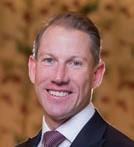
Harkness said that by making prudent decisions, SMEs were making sure they set themselves up to be sustainable in tough times. They also realised that there were

“We’re trying to purposely lower the [broker] barrier to entry by having products and documentation requirements that are approachable and easy to use” Cory Bannister, La Trobe Financial
Smart brokers choose OnDeck. In 1 hour, we’ll show you why.












At OnDeck, we know small business and we work fast to get your clients the solution they need, when they need it. No fuss.
With Lightning Loans® up to $150k, our decisions can be made in minutes and the funds available inasfastas 2hours. And, unlike most of our competitors, we don’t need any upfront security.
Give us an hour of your time, and we’ll come back to you with a solution specifically tailored to your client.

Once you give OnDeck a try, you won’t look back. Contact us today to learn more about our Broker Partner Program.
Get onboard: Visit ondeck.com.au/broker
Email broker@ondeck.com.au
Call 1800 831 294
plenty of opportunities to scale and excel.
“Whenever there’s uncertainty, that creates opportunity,” Harkness said.
“A lot of Australian SMEs are actually taking a stance that certainty will return, but every time you think it’s getting closer, it seems to be a step further away.”
He said business certainty would arrive at
But he pointed out that about 1.5 million additional overseas migrants were due to arrive in Australia over the next five years, and while all the media attention had been on the housing shortage, these people also needed places to work.
“The narrative is tilting now – from where it was previously about the office being a
I think the customer has the opportunity to make that decision and say, ‘Yes, this makes sense for us to obtain that capital’.”
LMG’s biggest area of concern was what Bannister touched on: existing customers who have loan facilities that they may be forced to move from.
“They’re in a position where they have to take a deal that’s probably not as good as what they’re on today,” Scahill said. “That could bring with it some challenges.”
Commercial finance broker Sukhi Singh, director of Infinity Finance Solutions, said clients were doing quite well and looking forward to the future. However, for some there was uncertainty, with the most recent interest rate rises sapping their confidence.
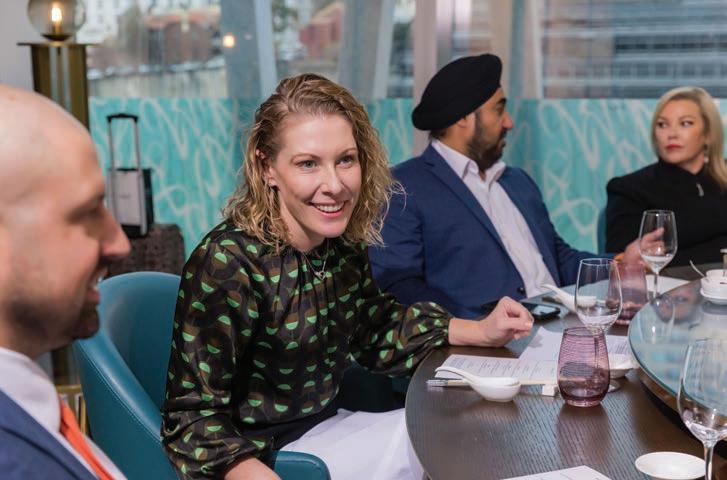
some point in 2023, with businesses just needing “to get through the coming months”.
“Our book is performing extremely well,” Harkness said. “Our SME commercial book is even outperforming our residential portfolio, which really goes back to the resilience of the borrowers.”
La Trobe Financial’s Cory Bannister shared similar views and said that while there had been challenges, resilience was also the word he would use.
“What we’re seeing is some opportunity where perhaps borrowers are faced with technical issues rather than actual fundamental serviceability issues,” he said.
Bannister said rising rates were causing second-order impacts, and whether these were seen in interest coverage ratios or review clauses, they were brought about by rapidly rising interest rates.
“So we’ve got an influx of borrowers who are looking to have to take a defensive step to play offence, so they have to go sideways or slightly back to be able to go forward with what their intent is.”
Commercial borrowers seemed optimistic about the longer-term outlook, Bannister said. On a macro level, “things looked pretty solid”, but commercial property, including offices, was a worry due to the work-fromhome phenomenon.

doom and gloom story, to actually there’s going to be a demand for office space,” Bannister said. “I think the medium- to longer-term outlook is quite encouraging for retail and other sectors as well.”
Stephen Scahill said broker aggregator LMG was confident about commercial finance. “For new funding, we’re in a good space. There’s a lot of capital out there, and whilst credit appetites might change, and some might push more into non-banks,
“They’re saying, ‘What’s the plan now? Where do I go?’ Half a per cent [rate increase] is not a big number for a lot of those clients, but it seems to be a moving feast at the moment – they don’t know where it’s going to get to,” Singh said.
He said some of Infinity’s clients who work in wholesale had been talking about hiring people six months ago, but that had changed. “I spoke to one client recently, a major import facility, who said, ‘I might have to reduce 5% of my salesforce if I’m to maintain profitability in business’.
“We have a strong capital position. We focus lending growth towards our niche markets – particularly the SME, health and agribusiness industries”
Karen Carter, BOQ Business

“In fact, we’re seeing more opportunities now in that space than ever before, and our asset mix continues to normalise postCOVID,” Bannister said. “For a while during COVID, there was a purposeful tilt to residential, due to the uncertainty in the commercial sector, but it continues to normalise as demand increases for products such as construction development.
“I agree with you, JP, that there’s been a tightening of liquidity in the market generally – private lenders have largely vacated that space for the time being due to the new challenges,” he added.
There were also more commercial opportunities arising for non-banks due to clients struggling with traditional bank ICR covenants and review clauses.
Saoud said “there’s absolutely no credit rationing” at Pepper Money. “We see there’s significant liquidity out in the market, and we’re there to take advantage of it.”
He said Pepper Money had been in the commercial lending space for three years, and in the last three months it had taken a significantly expansive approach, “whether it’s credit policy, loan limit or security type”.
“Those challenges are very real for the SME market. It comes down to profitability, for them to retain staff and run a successful business,” Singh said.
Jean-Pierre Gortan, managing director of commercial brokerage Simplicity Loans & Advisory, said that at the risk of contradicting Scahill, he believed there was a lack of liquidity in certain sectors of the commercial space – “whether that’s illiquidity or whether that’s credit rationing, or whether that’s just credit appetite”.
“Whilst there’s probably demand from the borrower side there, there is difficulty especially in certain sectors, such as land, to find the right capital partners; not a lot are really interested in that,” Gortan said.
This could be due to uncertainty over land value and “feasibility blowing up due to construction costs that are too high”.
Broker question from Jean-Pierre Gortan: Are there issues as far as capital inflows?
Are you just being more selective as to the kind of credit risks that you’re taking, or is it a combination of both?
Are you rationing capital? Is that a short-term approach to wait and see what’s happening with all these rate rises, or is it a fundamental shift in your appetites?
Bannister said there was certainly no credit rationing at La Trobe Financial, and volumes were peaking for the lender at present.
“We’re taking a cautious outlook on various segments of the market as you would expect, given the current macro conditions,” he said. But in terms of development and commercial finance in general, there had been no change in appetite at all.
“We’re looking to really grow in the space. We wouldn’t see any type of tightening of credit at the moment. We’re more focused around how do we take advantage of the right borrower cohorts and those right segments.”
Hyde agreed and said it was not so much about capital but credit appetite. “So it’s the commercial property fundamentals that ring true in the market. If you’ve got a strong asset, a strong developer, that’s ringing true, and we’re fully supportive. Where the caution lies is when you’ve got developers that are new or not familiar in the market, the appetite there is more cautious.”
Gortan said he thought that during the COVID period NAB was “anti-retail”, and he asked Hyde if this was still the case. Hyde responded by saying NAB had “opened up” when it came to retail.
“So we are comfortable [with lending for retail], depending on the location,” Hyde said. “When it comes to office space, we know there are ongoing challenges with working
from home for CBD property, but we’re seeing selected opportunities with an increase in office space needed in all major cities in the next 12 months.”
Harkness said ORDE Financial was seeing a lot of opportunity. He said brokers asked lenders, “Are there certain industries you won’t support?” But he pointed out that too many banks took a generalised view of lending, compared to ORDE. “We take a caseby-case assessment of every application based on the underlying characteristics of the individual, and this is highly important.”
He said that just because a specific industry had not succeeded during COVID, that didn’t necessarily mean a specific business also wouldn’t succeed.
“That’s become a really key area of focus for us – the credit solution approach on an individualised basis, investing a little time to get to know each application.”
Harkness said a lot of this work happened presubmission between BDMs and brokers –“putting our heads of credit into scenarios to give comfort to brokers that that scenario will actually go from start to finish”.
ORDE Financial had commenced as a new, broad-spectrum residential and commercial lender three years ago and established a strong funding platform to deliver an ever-extending


commercial product range to support brokers. Harkness said that, far from rationing capital, ORDE Financial envisaged significant further extensions of its funding capability.
He said there was considerable misunderstanding in the market of what was commercial and what was residential. He gave the example of developers buying land with a plan to build apartments or townhouses in five years’ time – these were small develop-
Carter said BOQ’s approach was to have a strong capital position. “We’ve been very deliberate on that. We do focus lending growth towards our niche markets, particularly the SME, health and agribusiness industries.”
How do you work with brokers to meet the needs of commercial finance clients while also supporting brokers diversifying into this space?
Scahill said that at LMG the most important thing was to understand the intent of the broker business.
“Not all broking businesses are set up to support commercial customers, so we need to give them solutions,” he said. “We develop referral programs where they’ve got someone that can either handle the transaction for the broker or guide them through the transaction in a co-pilot manner if their journey is to learn commercial finance.”
For brokers wanting to get involved in commercial deals, Scahill said training was crucial. “I think some of the failings with training in the past have been that it’s quite theoretical, that you go, you learn the fundamentals of commercial finance, and then off you go and ‘good luck’.”
Schill said LMG was trying to take a systematic approach as it did in residential
ments, two to four properties, and because there was a commercial intent, there was not a lot of lending support in the market.
“Supply chain issues and construction are starting to iron out … we look at it from a residential lens, understanding what the developer is trying to do; look at the underlying securities that are the true residential value and try to support them where we can.”
lending so that training took place within a supported platform.
In the area of lending for commercial auto equipment, Moloney said Resimac loans were solely originated through the broker channel. He said Resimac had staff across Australia to help brokers with scenarios on a daily basis, “whether it’s in a broker’s office or over the phone”.
“I think that’s the problem with allowing people to dabble [in commercial lending]: if you’re not doing it every day, you’re not doing it well”
Jean-Pierre Gortan, Simplicity Loans & Advisory
“We’re going live with a new system, which will make applications quicker and also decisions quicker,” Moloney said.
He had also seen one aggregator boast of a 20% increase in commercial brokers over the past year, and that was a great positive that proved the pathway was working.

Harkness said that commercial lending provided an amazing opportunity for ORDE Financial and brokers; in the residential space brokers enjoyed around 70% market share, but in commercial “we’re nowhere near that”.
“Brokers should be doing 70% of commercial and 70% of residential, and we think lenders have a big part to play in that,” he said. “We spent a lot of time speaking to brokers prior to launching ORDE Financial. One thing they were focused on was product diversity.”
Commercial lenders must show consistency of service, including time and solutionsfocused outcomes, Harkness said.
“What they [brokers] really wanted is a lender who would always help support them, work for a credit solution and make their credit team available.
“That was the key thing that we listened to – all the ORDE credit team are available; we put our heads of credit in scenarios, giving
direct access to any broker. This means you’re speaking to the end decision-maker; if they say yes, we'll find a solution for you.”
Harkness said this approach meant brokers could provide certainty to their customers.
Education was also important, as well as supporting brokers on their loan deals, he said. “All of our credit analysts’ phone numbers are available on the ORDE website, and we say to the brokers, call them because we want to educate as part of the process.”
“Building on that,” Hyde said, “when you’re talking about commercial finance client needs, it’s about connecting with an established network. So, for example, you’re financing an industrial warehouse, but you also need the invoice finance to stock the warehouse, and then you need the forklifts and the trucks. It’s about connecting the broker with internal networks that can assist
with those additional client needs as well.”
Carter said BOQ Business provided a commercial broker portal for brokers to access, featuring niche industry standards and summaries. “It helps the brokers understand the fundamentals that we’re looking for in the end deal. We also have questionnaires for brokers to ask customers and servicing spreadsheets as well, WALE and interest cover calculators, etc.
“We’re definitely doing a lot in the education space around our niche markets. For example, if you’re going to lend to a doctor, what does the average doctor earn? What is the fair market value EBITDA multiple for purchasing a practice?”
Carter said BOQ wanted to share this information so brokers were informed. BOQ educates brokers on specifics, including the cost of fit-outs, right down to the nitty-gritty of where electrical power points should be located.
“We’re just trying to make sure that brokers understand the industry because it’s easy to go out and say, I can get you 100% of fit-out, commercial lending or goodwill lending, but if the fundamentals of the deal and understanding of the industry aren’t there, it can become hard for the client,” Carter said.
Saoud said everyone was talking about broker diversification, the importance of supporting brokers and having stronger relationships with customers.

“We’re not only talking about selling them their home loan but how do you support them with their commercial lending or asset finance needs.”
He said those gathered around the table, whether banks or non-banks, were really strong on having accessible credit teams,
“Our book is performing extremely well – our SME commercial book is even outperforming our residential portfolio, which really goes back to the resilience of the borrowers” Ryan Harkness, ORDE Financial












supporting brokers by workshopping deals, and trying to get the speed to yes on credit decisioning and a more predictable and consistent outcome.
“Where we can probably look to support brokers better is about how they farm for their business, because we can all do well on credit,” Saoud said. “But I think for brokers, how they deepen relationships, market to their existing customer base and how they really focus on diversification is key.”
Saoud said aggregators did this well through data insights and analytics. “That’s where the big growth will come – taking that broker base from where we’re currently writing less than 40% of commercial loans into the 70% and above.”
Scahill said it was about the same people making the decision. “So the person deciding how to access their capital for commercial also owns a home and most likely has dealt with a broker.”
“It’s ensuring there’s that consumer awareness that brokers can o er all forms of facility as opposed to just residential lending,” Scahill said. “That’s the message we want to get out there. We’re huge

believers in the growth of broker share in commercial lending over the next four to five years; we think it’ll nearly double.”

credit appetite and would take it elsewhere, saving that lender time and money.
Bannister answered the question by saying
NAB
Broker question from Sukhi Singh: Where is the di erentiation and recognition from lenders that takes into account those brokers who specialise in commercial and instead of just originating the loan are in e ect managing the process due to their expertise?
Singh said brokers who specialised in commercial finance could recognise when a certain deal would not fit a specific lender’s
that La Trobe Financial tackled this in a couple of ways. “La Trobe Financial segments our credit teams between residential and commercial, but equally, the people that are coming to us on a regular basis will have access to a dedicated credit team as well, so there’s a familiarity there for the brokers and credit sta , and that’s important.”
On an industry level, Bannister said the non-bank had taken a di erent approach. “We’re trying to purposely lower the [broker]
“There are challenges with working from home for CBD property, but we’re seeing selected opportunities with an increase in o ce space needed in all major cities in the next 12 months”
Anita Hyde,
5
barrier to entry by having products and documentation requirements that are approachable and easy to use. We acknowledge that that’s not easily achievable in all aspects of the commercial market, so I certainly understand why the banks perhaps wouldn’t have it that way.”
Bannister conceded there were two schools of thought about whether there should be a high barrier to entry for brokers into commercial lending, with experienced brokers wanting a higher barrier. “That’s totally appropriate when it comes to dealing with complex products with lenders that require a lot of ratios and complexity.”
But La Trobe Financial wanted to see the broker channel prosper and the commercial broker market share get closer to the residential market share of 70%. The company wanted to play its part in assisting brokers on
products that were reasonably non-complex, by reducing barriers to entry. This included having no specific accreditation requirements and using a credit analyst to train the staff and salespeople who are educated on these loans.
Harkness said ORDE Financial had been able to build its technology platform from the

ground up to be highly focused on digital, supporting and enabling credit analysts. This was particularly true once operating at the scale volumes that had impeded other lenders in recent years.
“Slightly different to Cory’s model, we actually like our credit analysts to do commercial and residential together,” he said.
“For the past three years, the new ORDE Financial platform has been delivering two-day service standards consistently across residential and commercial.”
Harkness said many clients had both residential and commercial loans, and “splitting that deal with someone looking at the commercial or residential, you might end up with two different outcomes”.
“Looking at the deal in totality and understanding the security that we have available enables us to make a decision that’s optimal for the broker and the end client that they’re working with.”
He said the non-bank was investing in its technology to bring consistency to credit assessment, not to define the end outcome but to spend more time finding the solution.
“More time on the solution means we don't have to differentiate between brokers; we want to give all brokers two-day turnarounds. We think we can deliver service to all and help them win clients.”
Hyde said NAB had lifted its broker standards for entry higher in regard to experience in commercial.
“At NAB we’ve got a really big support network, and we’ve expanded our small business BDMs for this reason – for those entering the market to provide more support in the
“We’ve got the upcoming Olympics in Brisbane. Look what’s going to be happening in the next 10 years; there’s a new airport in Sydney, there’s roads being built everywhere”
Michael Moloney, Resimac Asset Finance
small business space,” Hyde said. “We’ve also launched more dedicated broker bankers … we have lifted the criteria. We’re also providing more support for those brokers that do want to enter.”
Scahill said there was a systemic challenge – “so many good bankers are now brokers”.
He said in many cases a more experienced broker would put the credit memo together and give it to a less experienced banker to vet and handle the credit.
“There is an opportunity for experienced commercial brokers to be dealing direct to credit, getting that submission straight through, stripping cost out of the processing time and cost for the bank. Equally, there’s an opportunity for more reward to the broker to reflect those savings.”
Scahill said there was an opportunity for the industry to segment, recommend and recognise highly experienced commercial
brokers and have a different process for them.
At Resimac, Moloney said there was a combination of the digital platform and broker training. “Our portal certainly goes straight through to credit – that’s where the training piece comes in. But if it all goes to the head of credit, that’s also problematic, in my view.”
Brokers needed to know what was likely to get approved, so it could be a “cleaner” credit process. “On the lending side, we’re continuing to train our credit analysts as well,” Moloney said.
Gortan said he had a slightly different perspective: it wasn’t so much about whether a broker knew how to get a loan deal done or get an outcome; “it’s probably more around depth of their actual offering”.
“How many lenders they know, what they understand as far as the offering available in the market, and [how they] can get an
optimal outcome, not just an outcome,” Gortan said.
“I think that’s the problem with allowing people to dabble. If you’re not doing it every day, you’re not doing it well. I've been doing [commercial finance] for about 20 years; I learn every day, and there’s something else that pops up and you go, OK, great – that now becomes an offering in your bag.
“Unless you're actually doing these deals intensively, you can’t be getting the best outcome for your customer.”
Carter said BOQ Business’s dedicated, specialist broker team members dealt directly with brokers. “They know what to look for and ask for when they’re having a conversation about SMEs.
“I agree with Steven and the two brokers in the room about experience – it certainly gives them a rite of passage to write a deal and send it straight to credit, because you

know that the quality of the deals that you’re getting from them is first class, and they’re going to put a good submission together. There should be some consideration from banks in that regard.”
How are brokers operating successfully in asset finance? How can lenders assist them in the transition?
Moloney said that from a lender’s perspective, brokers should look at the market and figure out “where’s the growth? Where’s the government incentives? Where’s the opportunity?”
“We’ve got the upcoming Olympics in Brisbane. Look what’s going to be happening in the next 10 years; there’s a new airport in Sydney, there’s roads being built everywhere,” he said.
While some asset finance sectors were not doing so well, brokers and lenders needed to keep their core customers happy. “It’s about being aware of the tax incentives, the right asset write-offs, and electric vehicle tax rebates,” Moloney said.
Singh said the customer interface and ease of doing business were highly important. “If it’s a bigger client, we will always have a limit placed with the lender. But for the standalone
stuff, it’s how intuitive the interface is – for somebody in office to be able to plug in, get an outcome and then take it to settlement.”
Car finance had rebounded in the last 12 months because dealers’ rates had “gone through the roof”, Singh said.
Brokers wanted applications that were easy to originate, he added. “Sometimes a 12-page application is not the right way to go for a $50,000 car: it’s not the right return on time. But there are options in the market where you actually spend half an hour on originating a loan and getting it through.”
Gortan said that as with commercial and residential finance, it was best to use a specialist for asset finance. Simplicity Loans was involved in some simple asset finance such as leasing, but it didn’t specialise in this area.
“The brokers that do it all the time have 40 or 50 different offerings; they can deal with all the different levels, and that’s a better outcome,” Gortan said.
“Pepper Money and Resimac both have specialist products and service that specific market, and that’s why they get good volumes. Unless you’re actually doing a significant amount of volume and know who all the people are, it’s difficult to come up with an offering.”
Simplicity Loans referred asset finance to specialists to get a better outcome for the customer, Gortan said.
Saoud said Pepper Money’s asset lending business had been quite successful, especially in the last few years. “We grew last calendar 35 times system growth, and that’s principally around our investment in our digital technology.
“It’s a high-volume business, and you’ve got to make it easy for your brokers, easy for the customers – the time to yes, and that predictability on credit decisioning.”
Pepper Money had invested a lot of time in the system, data insights and credit decisioning. “You need that expedited approval –that’s what we know our customers and brokers want,” Saoud said.
He agreed it was important to have that segmented service delivery for high-volume brokers who did it well, but said it was also important to have help available for brokers who were diversifying into the space.

Scahill pointed out that technology had a big part to play in asset finance. He said there was absolutely no reason why the residential broker experience of operating from their own platform, analysing lender appetites, and saying to clients ‘here are

“We’re huge believers in the growth of broker share in commercial lending over the next four to five years; we think it’ll nearly double”
Stephen Scahill, LMG
Electricity, gas, water and waste services
Information, media and telecommunications
Other services
Arts and recreation services
Mining Construction
Transport, postal and warehousing
Wholesale trade
Retail trade
Administrative and support services
Professional, scientific and technical services
Accommodation and food services
Source: Australian Bureau of Statistics, June 2023
the rates and options’, couldn’t be replicated.
“We see that in asset finance – the experience for the asset finance broker, it becomes much more aligned to what happens in resi-
Hyde said the other point to add was about brokers working really closely with clients, particularly at the end of the financial year, to determine businesses’ future plans,
promptly at a later stage’,” Hyde said.
Commenting on specialist lending, Carter said BOQ had looked at how it could service the A-plus clients and give them easy access to money for equipment and cars, fit-outs, etc.
“We can do a 24-hour turnaround on that space given our understanding of the industry,” he said.
dential lending, and it makes it accessible for more brokers,” Scahill said.

Asked by Gortan if he knew the depth of the market for broker-originated asset finance deals, Scahill said LMG didn’t have exact figures: for commercial it was at the low 30% mark, but for asset finance it was unknown.
taking into account stock delays and perhaps setting up revolving credit limits.
“Always ask the question as, to remove that urgent time to yes, instead it’s taking a forward-looking view and saying, ‘let's leave some headroom in that limit so that you can come back and acquire the asset
Bannister said there were a number of growth areas La Trobe Financial was looking at. One was commercial property, where clients were running into problems with ICRs.
“That’s fertile ground for what are really high-quality customers that are just technically falling outside of a point-in-time criteria. That’s something we’ve got our eyes open for,” he said.
Development finance was another area
“It’s a high-volume business, and you’ve got to make it easy for your brokers, easy for the customers – the time to yes, and that predictability on credit decisioning”
Barry Saoud, Pepper Money
with a “huge undersupply that needs to be addressed”, Bannister said.
“We think we’ve got a part to play in that because we’ve got some flexibility and some heft, not in high-rise stu but we consider loan applications up to $25 million; we can do some good work around that 40- to 50-apartment-space living – there’s great demand for that.”
Regarding the level of presales required, La Trobe Financial had some flexibility there, which helped not only with the development but also with residual stock.
Bannister said the final growth area was build-to-rent, with some larger institutional players recognising the opportunities. He said AFR had reported there would be $10bn worth of build-to-rent by 2030.
‘“We won't be at the end of the spectrum but certainly on a smaller scale. We’re seeing lots of developers now seeing the strength of rents and the opportunity and benefits to develop and hold for a four- or five-year period.”
Harkness said opportunities lay in debt consolidation in the commercial space for SMEs. During COVID, SMEs took out short-
term high-interest-rate loans for working capital, and post-COVID to restock and stock supplies and assets.
“We think there’s good opportunity, especially with interest rates going up, to support debt consolidation and refinance
under simple 30-year mortgages,” he said. “Making sure people are aware that nonbanks can do commercial 30-year set and forget.”
ORDE Financial wanted to get people to enter commercial mortgages not for shortterm benefits but for medium- and longterm benefits.
“Having an ICR test at the end of one year is not necessarily reflective of a bad customer. It might just reflect that they haven’t had a chance to reset their rental yield, which they’ll probably get in the next six or 12 months,” Harkness said.
“So being able to give customers certainty of long-term view is something that we’re here to support, and that we think there should be greater education on.”
He said ORDE was keen to continue supporting brokers to support SMEs.
Moloney said waste, water and energy were areas Resimac was heavily focused on. “Some people have a negative view of construction development, but we really like it. If immigration continues the way it's going, I think it’s certainly a sector we’re focused on.”
Resimac was also looking at all the SMEs that were peripheral to big infrastructure

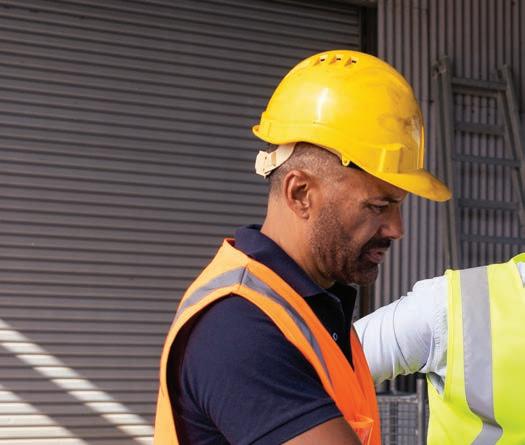















builds and health. “I think there’s a lot of strong sectors, notwithstanding what we see in the current environment. I think there’s some interesting shifts,” Moloney said.
Hyde said it was a very exciting time for brokers: there were “a lot of opportunities out there” with housing supply being a major issue at present, including housing for NDIS, which presented construction opportunities.
“In terms of o ce space, we’ll see that likely pivot in the next 12 months as more people return to work,” she said. “We’re seeing more business customers use commercial brokers, which is really exciting for the space.”
Singh agreed it was an exciting time. He said one area of expansion for Infinity Finance Solutions was SMSF funding.


“So that’s actually come a long way for us in the last two years to a point where it’s becoming a little business within a business for us. That’s something we do a lot and is gaining a lot of traction.”
Singh said the brokerage also specialised in childcare finance. “So we’ve got consultants who will find a site and go through the DSCC process, the building lease, etc. You see that whole cycle go through from inception to when it’s finally operating.”
growth of broker participation in the commercial lending space and how the industry supported it – was first and foremost.
“Secondly, there’s a good opportunity in the non-bank space. I think there’s going to be some significant macroeconomic chal-
He said childcare appealed to investors because, once the childcare centre was operational, there was no land tax. “Investors in New South Wales hate land tax, so I think that’s a big thing for the clients, and we’re happy to facilitate the same.”
Saoud said what Scahill referred to – the
lenges with di erent lenders acting more conservatively.”
Saoud said the challenge for non-banks was how they could be expansive on security types but also credit decisioning.
“How do we look behind financials and actually understand the customer and have
“SMSF funding has come a long way for us in the last two years, to a point where it’s becoming a little business within a business”
Sukhi Singh, In nity Finance Solutions



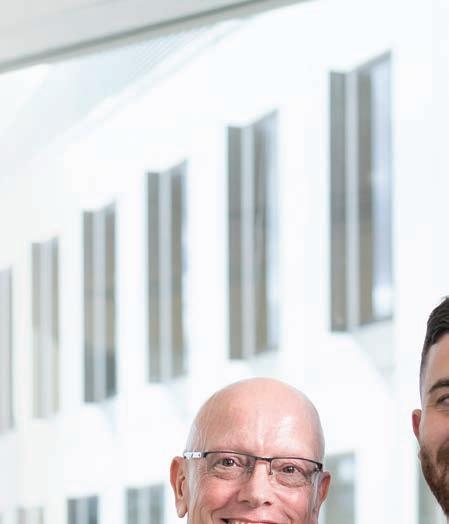






“That’s where the non-banks are well positioned, given they don’t have a cookiecutter approach to credit assessment. I think that’s where there’s going to be really significant growth,” Saoud said.
“Given that with the macroeconomic challenges and what’s happening in the SME market, I think you’re going to have to take a little bit more in-depth analysis on your borrower profile.”
Gortan said that while brokers who had dabbled a bit in commercial lending over the last few years would go to a lender and could get the loan to stick, “I think the lenders have moved away significantly from that. You need someone that understands the situation, knows something that niche lender will do specifically, that you can’t necessarily just find by walking into a major bank.”
There would be opportunities for experienced, specialised brokers, he said.
Commenting on ex-bankers who became brokers, Gortan said that while credit skills transferred across the two professions, being a broker was very different. “Because it’s very easy in a bank to say, ‘look, I can’t help

you’. As a broker, you don’t have that option. You’ve got to say, ‘OK, well, I can’t get you what you actually want, but this is the best that’s available for you because of these reasons’.
“So it’s going to be a little bit of a purple patch for brokers that specialise in this space, because it’s significantly harder than
it was 12 months ago or two years ago.”
BOQ Business was specifically seeing growth in health, agriculture and manufacturing. Carter said there had been a bounce back in financials in 2023 for many SME clients, compared to 2022 when profitability was down, affected by COVID.
“Our arrears are low. We want to lend; we want to try and open up in the areas that we think are our growth areas and where the niche is,” Carter said.
“We’re really excited about what we want to do and how we’re going to play in the market. There’s plenty being worked on at the moment to continually improve our services to the broker industry, because we believe in it so much.”
Scahill said there would be broader funding requirements, and brokers would need to search further afield for loan options. “Some of their traditional lenders may not be able to facilitate transactions that they have done in the past. The role we’ve got to play in that is to scour the market, understand the good operators in the different spaces, and make sure that our brokers have access to them.”
That may involve either working with existing partners to try to broaden their credit appetite or looking for additional partners that could facilitate these transactions, Scahill said.
What happens when your business has enjoyed strong growth but hits a ceiling and levels out? Business strategist and author Chris Green says SMEs need three foundations to sustainably grow

A FAMILY-OWNED dairy distributor, founded in 1985, had held market dominance since the business started up – until 2017 when everything changed. The local milk production company closed the factory and stop producing its brand. The distributor’s whole world crumbled overnight.
Having had the advantage of a superior local product, this small business did not have the business systems, the people capability or the knowledge to compete in a hypercompetitive market. Unfortunately, this is an all-too-common story in the SME world and in different industries everywhere.
Many businesses are characterised by a period of high growth when things seem effortless and customers are plentiful, but without forethought, these businesses hit a ceiling and are unable to scale in any sustainable way. That’s why the key to SME success relies on having three firm foundations in place:
1 Get financially literate Financial reporting, modelling and budgeting are activities that many small business owners struggle with – or even avoid. Many see these processes as a waste of time because they are based on assumptions; while
for others, interpreting the numbers in a business context can be challenging.
The reality is that numbers are the language of successful businesses. You must know what your numbers are telling you.
By undertaking a robust budgeting process, you will better understand the opportunity cost of deliberately allocating resources to one area of the business at the expense of another. It’s a discipline that forces you to decide how you will or will not compete; how you’ll choose what competitive advantages to invest in and think about how the market may react.
Considering direct costs, variable costs, overheads and capital expenditure in light of anticipated revenue enables you to explore what-if scenarios. In doing so, you can better understand the potential impacts of decision-making.
Record and transfer all knowledge currently in your head. Traditionally, this would have been mapped out into an operation manual, training program, or anything that takes what you know and puts it in a form others can follow. In the modern era, there’s an endless stream of software applications and videos that make this possible.
Over time you will create a templated process for capturing the information you know and disseminating it to the team. If you find there is still a significant gap between what you know and the capability of the company to execute it without you, this may indicate a skill gap you need to either recruit or train for.

Once you have your information-recording system humming, it’s time to get your team involved and have them capture the information that’s in their heads. Over time, this process of systemising a business creates performance consistency. Not only that, but if you’re looking to sell, scale or replicate your business in the future, you will have created real value in your business model.
For many business owners, taking the time to stop and reflect rather than motor on at a hundred miles per hour is uncomfortable because it requires self-reflection to dive into what is truly important. Who has time to waste doing this when there are so many more important tasks to complete in the day-to-day?
Yet you need to know what’s truly important to you and what your values are so you can prioritise business actions accordingly.
In his book Traction, author Gino Wickman suggests that to define our values in a busi-


ness context, we should think of three people who, if we cloned them, would lead to market domination. What are their characteristics? What do you most admire about them? What is it about them that would lead to market domination?
Identify your top five scoring words and draft a sentence that explains what each word means to your organisation and why it’s important. Sometimes it’s valuable to do this exercise with your team to get buy-in and encourage behaviours that align with the values.
Celebrating behaviours that align with your organisational values, and managing behaviours that do not, allows you, as the
owner, to set the standards. Standards that will facilitate accountability as the business transitions to a more disciplined and accountable structure.
Like the concrete slab of a house on which all else is built, the above three foundations are the bedrock on which your business can be built so it can weather any storm or market disruption.
Taking the time to stop and reflect [can be] uncomfortable. Yet you need to know what’s truly important to you and what your values are so you can prioritise business actionsChris Green is author of BusinessbyDesign as well as a business strategist, mentor and facilitator with more than 20 years’ experience helping regional businesses. Find out more at chrisgreen.com.au.



The Australian Mortgage Awards will bring together the cream of the crop from the mortgage industry, vying for the most prestigious prizes and well-deserved recognition. Join us for an unforgettable evening celebrating the achievements of the leading brokers, brokerages, lenders, aggregators and BDMs over the past 12 months.








The awards gala will be honouring the Winners and Excellence Awardees, providing the perfect opportunity for key members of the mortgage industry to come together, reflect on a remarkable year, and celebrate their stellar work. TV personality and radio host Merrick Watts will be taking the stage as MC, while attendees can dance the night away to the tunes of the energetic party band SongDivison.
We extend our heartfelt congratulations to eachof this year’s Excellence Awardees and look forward to seeing you all there! To view the complete list of awardees, simply scan the QR code below.


RISING LEVELS of stress, burnout and mental illness mean mental health conversation skills are no longer a nice-to-have but necessary. Leaders are expected to provide psychologically safe and mentally healthy working environments yet often lack the skills and training to support the wellbeing of their people.
With the amendments to the Work Health and Safety Act in April 2023, organisations and leaders are now required to both provide a psychologically safe working environment and manage psychosocial hazards. This includes providing a healthy working environment, actively managing the work causes of stress before they get out of hand, and providing support for mental health issues.
Mental health is a safety risk in the workplace, with over 90% of Australia’s mental health compensation claims linked to work-related or mental stress. The three most common causes of mental stress are preventable and relate to a lack of psychological safety at work: work pressure; work-related harassment and/or bullying; and exposure to workplace or occupational violence. We are also seeing increased numbers of people experiencing chronic stress and burnout.
While the signs of mental ill-health are not easy to see, mental health challenges are natural and common, not a niche issue to delegate to human resources. At least one in five people in our teams right now are experiencing a diagnosable mental illness. More than 50% of people with a common, diagnosable mental illness don’t receive professional
or in teams, and the performance expectations come with a range of measures for assessing our levels of performance and success.
Less explicit and often more informal, unwritten and unmeasured is an assumption that we will also manage the wellbeing of our team within the cracks of our leftover time. But when we don’t manage the interpersonal dynamics well, leave those who are unwell to struggle, allow interpersonal conflict to fester,
help. So people are struggling on their own who don’t need to be. And research shows that the earlier someone connects with help, the easier and shorter their healing journey is likely to be.
Most of us move into leadership and management roles with clarity around the strategies, targets, projects and results we are expected to deliver. There is an investment in training for induction and then ongoing time dedicated to work-in-progress meetings, either one-on-one
or accept poor performance, we undermine both our own health and performance and that of our overall team. A mentally healthy environment is one in which leaders protect, respond to and promote mental health for their people.
While burnout and mental health issues have traditionally been viewed as an individual’s problem to manage, the reality is that these won’t be solved without leaders proactively managing a healthy working environment. This means mitigating the risk of psychosocial hazards by ensuring that your people have the clarity, prioritisation, training, support,
Business leaders need to take the mental wellbeing of their staff seriously and ensure they implement effective strategies in the workplace, says author and leadership expert Fleur Heazlewood
A mentally healthy environment is one in which leaders protect, respond to and promote mental health for their people
resources, knowledge, feedback and supervision they require to perform their jobs healthily and well.
The most common challenges I hear are a lack of competence and confidence in recognising the signs that someone is struggling; providing psychological safety; knowing what to say or how to respond when someone isn’t OK; what is appropriate support; and how to manage both care and performance.


When we see someone struggling, we need to reach out and make the e ort to connect. We don’t have to be experts in mental health to have a caring conversation that connects
someone who needs help to support. Someone experiencing mental illness will, most of the time, function well at work with support and professional help. The good news is that mental health and wellbeing literacy is something that can be learned and added to our leadership skills toolkit. It also provides us with a performance advantage.
When we provide a psychologically safe environment at work, all our team members are able to contribute and do their best. Mental health conversation competence strengthens relationships with and within teams and leads to increased trust and improved communica-
tion, collaboration and overall performance. The more openly team members can discuss issues as they arise, admit mistakes and ask for help, the less likely that mental health and wellbeing challenges will turn into performance problems. And research clearly shows that people who feel valued and supported at work perform better, are more engaged and stay longer. To put it simply, people who are well do well.

FINSTREET has grown and transformed from a brokerage into a high-tech customer-centric mortgage manager dedicated to helping brokers and borrowers gain access to fast, flexible loan products
IN THE fast-changing and complex world of lending, brokers need to be at the top of their game to keep up with all the credit policies and loan products in the market. They need to act in the best interests of their clients and find the loans that suit their clients’ needs. That can be difficult when there’s a myriad of options to sift through.
building deep partnerships and trusted, long-lasting business relationships, which ensure that everyone in the value chain is successful. “However, to achieve this goal, two key factors underpin our success – a broad product offering, and increased education in the dynamic lending space,” Liu says.
FINSTREET offers more than 40 loan
brokerage to a mortgage manager fintech.
“The biggest evolutions to date have been the business, brand and tech strategic transformation to FINSTREET Group,” he says. “This means we continue to quickly scale up our business model to help brokers and partners to accelerate their growth with us.”
Jurisic says he has seen the big challenges facing traditional broker offices, including broker and bank competition, lack of succession planning, and retention of skilled staff. “This all adds up to a zero-sum game where the environment leads to aggressive competition to acquire customers.”
This is where Sydney’s FINSTREET comes in. The company is more than just a brokerage, says co-founder and chief strategy officer Darren Liu. He describes FINSTREET as a mortgage manager fintech that has a “broker and borrower-led purpose committed to providing outstanding service and flexible solutions across a comprehensive, dynamic lending non-bank product range”.
The company has more than 30 employees nationally who support borrowers with their financial investments and business cash flow.
“The backbone of our strategy is our purpose: to grow further, together, with brokers, borrowers, investors, partners and, equally important, our people,” Liu says.
FINSTREET’s proposition is focused on
products and over 100 niches in the non-bank solutions space, covering low-doc, expat and non-resident, specialist, PAYG, NDIS, construction, commercial, SMSF bridging, short-term and investor lending.
Group CEO Boban Jurisic says the company has transformed and grown from a
FINSTREET understands how brokers can grow together, Jurisic says. “We’re re-augmenting the mortgage value chain, creating more referrals between partners and brokers; using our FINSERV platform to help brokers access the single-largest gateway of dynamic lending; providing market education; and working with banks and other lenders in partnership to help
“FINSTREET has a single simple goal,” says the brokerage’s co-founder and chief strategy officer, Darren Liu. “By focusing on supporting 1,000-plus brokers with two dynamic lending client needs – assisting more than 2,000 Australian borrowers – we aim to make a significant impact in the mortgage industry and help grow our sector. By partnering with brokers, we can provide more personalised assistance and guidance to help their customers positively navigate the non-bank home loan experience.”
“Brokers can quickly find dynamic non-bank options and a seamless path to funding for their clients” Darren Liu, FINSTREET
grow the dynamic lending pie in Australia.”
The company also places an “enormous emphasis on our service and takes delight in solving problems for our brokers and borrowers”, Jurisic says. “That means constantly improving our processes, delivering fast and reliable options, and empowering our broker partners to become better trusted advisers.”
One of the ways it does this is through the group’s Dynamic Lending Association hub.
“This is currently being overhauled to include new course material, and education, coaching and mentoring to help brokers, introducers, referrers and our own people learn the nuances particular to their role within dynamic lending,” Liu says. “In turn, this will help them be better, confident, more professional advisers to help o er beneficial flexible lending solutions to many more Australians.”
FINSTREET also boasts a highly experienced lending team, including sales, marketing,
credit, operations, finance, board, executive leadership, tech and “everyone in-between”.
As well as providing access to decisionmakers in the business, Liu says the company has dramatically improved its digital solutions through the FINSERV platform – a real game changer in the market. It’s designed to tackle serious limitations brokers and borrowers face in the industry, such as slow processing times, information overload and siloed experiences.
The ever-expanding FINSERV technology application is a key enabler of strong broker business growth, Liu says. “Brokers can quickly find dynamic non-bank options and provide accurate, fast assessments and a seamless path to funding for their clients.

“Every time a deal goes through, we get data feedback from every touchpoint of the application and qualitative feedback from our credit assessors. This supercharges our lending process and, even more important,
Owner: Privately owned
Location: Sydney, NSW
Services: Alt low-doc, full-doc, expat and non-resident, specialist, PAYG, NDIS, construction, commercial, SMSF, bridging, short-term and investment lending
Number of employees: 30+
brings about more responsible lending.”
FINSTREET’s Product Engine also encourages brokers to go beyond traditional channels to find the right solutions for their niche clients.
“Brokers can leverage our product engine to quickly discover the right option for the client as soon as they get an enquiry,” Liu says. “The engine drives a smoother deal flow for brokers and at the same time enhances every borrower journey.”
FINSTREET also proactively responds to market challenges – including rising interest rates and inflation – and the changing employment profiles of borrowers post-COVID by providing a diverse range of lending products.
“By o ering solutions for start-ups, selfemployed individuals, and borrowers with multiple jobs, we are addressing the specific needs of these customer segments, which can lead to increased market share,” Liu says.
The business also embraces more complex transactions such as construction, SMSF and commercial loans and short-term/bridging lending to cater to a wider range of borrowers.
Investing in and partnering with brokers aligns with the collaborative nature of the mortgage industry, Jurisic says. “By providing brokers with the necessary tools and technology, we can enable them to better serve their clients, enhance customer relationships and improve customer retention e orts.”
He says FINSTREET will continue to adapt to the changing market and invest in innovative solutions to position itself as a progressive and customer-centric lending fintech.



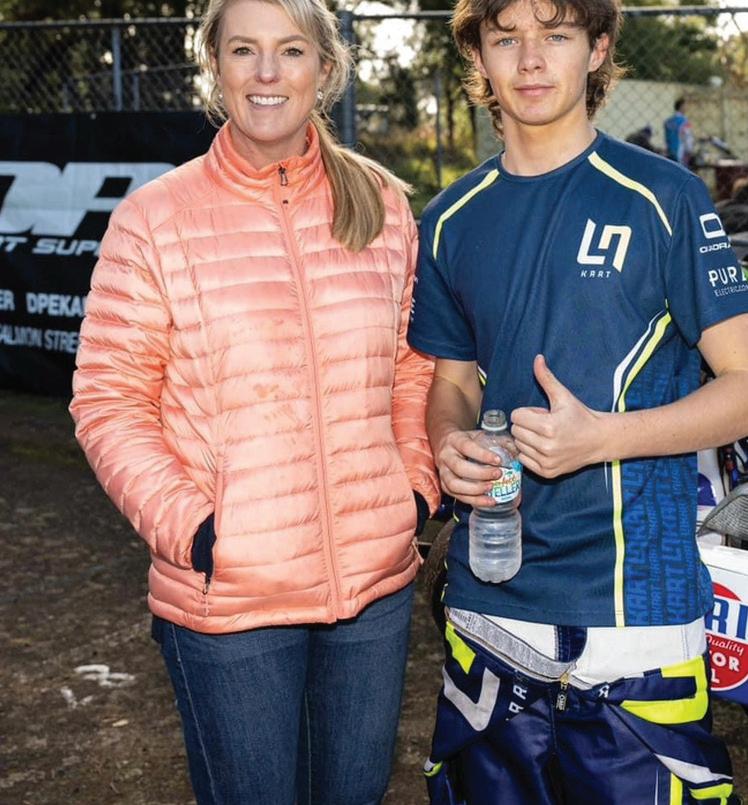
NARELLE KERSTAN, mortgage specialist and director at Gloss Finance in Hobart, was used to working long hours. Then 18 months ago she decided to find a more balanced lifestyle. That meant spending more time with her teenage son, Harrison Duske, who, like her, is passionate about cars and racing. Kerstan became involved

in her son’s ambition to enter the go-kart racing scene.
“We travel to Victoria every month to compete in go-kart racing, of which Gloss Finance is a major sponsor, and also attend the Tasmanian races, so we are doing a lot of travelling every month, which we both thoroughly enjoy,” Kerstan says.
“We have a team of men who look after my son and have his go-kart ready when we fly into Melbourne, and who are now wonderful friends.”
With Kerstan’s support, Duske is now a Tasmanian state champion, racing towards his dream of competing in Supercars or F1 some day.

“Go-karting enables us to spend quality time together surrounded by great people, and we get to travel often, which we both also love”
















































